Movie/TV Reviews
**Reviews may contain spoilers**
All reviews are obtained from various online sources ranging from semi-professional blogs to industry trade magazines and movie sites.

#9
9 is the animated tale of a world destroyed by its own need for technology. In the wake of this destruction, all that is left are violent machines that scour for anything that might have survived and a small group of creatures created by the scientist responsible for the ultimate killing machine that wiped out the population.
The scientist, woeful over the machine he created, decides to make small burlap-covered creatures as an act of redemption (maybe even as a way to recreate humanity). All numbered sequentially, they represent the various human qualities of the scientist and when number 9 (Elijah Wood) is born, the elderly scientist is left dead on the floor, and now 9 is has to figure out just what he is and what the world is around him.
Director Acker brings his unique stitch-punk vision alive that he first created through his 2004 Academy Award nominated short film but on a much larger scale now. With a feature-length film, Acker was given an opportunity to really flesh out his characters and explore the idea of what makes us human and just how as a society we need to be able to work together for a better existence.
What’s also remarkable in terms of 9 is that it doesn’t feel animated. I know the movie is filled with vocal performances only, but somehow I felt like I was seeing the actors on the screen and not creatures. Wood’s performance of the titular character 9 is just wonderful, and Connelly’s voice just sparks on screen whenever 7 is featured.
One of my favorite characters that isn’t as predominantly featured as the others is number 6 (voiced by Crispin Glover). 6 is the one who has figured out how to destroy the machine that ruined the entire planet, but because of his manic behaviors (with slight autistic tendencies), no one listens to him. Glover plays the character with a quiet restraint and an almost playful demeanor. It makes me long to see Glover working regularly again on quality projects.
As a bit of an animation geek, I remember the awe I felt the first time I saw a trailer for 9, and somehow the trailers don’t even do the movie justice in terms of all of the startling but stunning visuals used throughout. The art directors and animators on 9 somehow find a way to make the devastation of our planet look beautiful and haunting all at the same time.
9 manages to have an underlying socio-political message, an exploration of the many facets of human nature, and still finds a way to be a breathtaking and entertaining animated feature that leaves you engrossed until the very end. That’s no small feat and is due to Acker’s abilities as a storyteller.
Be warned though – 9 is not a Disney movie by any means. There are some sequences that will definitely be too harsh for the younger crowd, but the animated feature is something that I feel audiences ten and up will enjoy. The movie does end on a bit of a downer, but somehow it doesn’t feel like a downer – which, again, is due to Acker’s ability to show cause and effect in a manner that is both realistic but still satisfying for audiences.
9 has a very Coraline-esque tone to it, so if that’s a film you enjoyed, then this movie is definitely something worth checking out on the big screen.
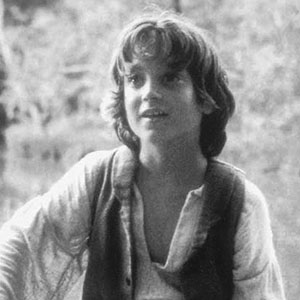
Huckleberry Finn
The story of Huck and Jim has been told in six or seven earlier movies, and now comes “The Adventures Of Huck Finn,” a graceful and entertaining version by a young director named Stephen Sommers, who doesn’t dwell on the film’s humane message, but doesn’t avoid it, either. The transformation of Huck is there on the screen, although much more time is devoted to the story’s picaresque adventures, as Huck and Jim meet a series of colorful characters – including some desperate criminals, some feuding neighbors, and the immortal con men the King and the Duke.
Huck is played by Elijah Wood, who mercifully seems free of cuteness and other affectations of child stars, and makes a resolute, convincing Huck. The real Huck (based on a childhood friend of Twain’s) was probably much tougher and had rougher edges, but Huck has been sanitized for years in the movies (just as the Widow Douglas tried to “civilize” the original). Jim, the crucial character in the story, is played by Courtney B. Vance, a New York stage actor who is able to embody the enormous tact with which Jim guides Huck out of the thickets of prejudice and sets him on the road to tolerance and decency.
The supporting cast is uniformly splendid, especially Jason Robards and Robbie Coltrane, as the King and the Duke, who impersonate visitors from England in an attempt to swindle two innocent sisters out of their inheritance. It was a little eerie, halfway through the movie, to realize that Twain wrote the original American road picture.
I read the book for the first time when I was 7, understanding every other word, and I have read it a dozen times since. For me, the best passages are those in which Huck and Jim are alone on the river, debating such curiosities as why the French speak a foreign language, and how many stars there are in the sky, and whether it is all right to steal fruits that are in season if you make a solemn vow not to steal fruits that are out of season. Twain punctuates these passages with lyrical descriptions of the mighty river, and of a thunderstorm that reminds him of barrels rolling down a giant staircase.
And then Huck and Jim drift onto the subjects of race and slavery, and Huck is bound to admit, after Jim explains it to him, that black people have the same feelings as everyone else, and are deserving of his respect. This process of Huck’s conversion is one of the crucial events in American literature. Some cannot admire it and think it should not be taught in schools because Huck, like every boy of his time, used the “N” word. They are very short-sighted.
The movie, of course, doesn’t use the word, nor does it really venture very far into the heart of Huck’s transformation. It wants to entertain and fears to offend. But it is a good film with strong performances. Nothing in it is wrong, although some depths are lacking. I admired the performances, and Sommers’ sense of time and place, and I hope the movie guides more people toward the book – which contains values that sometimes seem as rare today as when Jim was first teaching them to Huck.
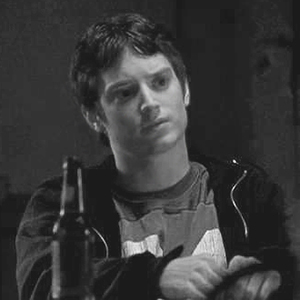
Sean Sullivan
From the moment I saw his debut film The Brothers McMullen in 1995, I was a fan of writer/director Edward Burns. He has such a talent for capturing the way people speak to one another. The dialogue in his movies often rings true to me. Good dialogue is one of the hardest things to capture in a film, so when someone does it, I can t help but sit up and take notice. McMullen and its follow-up, She’s the One were romantic comedies, but Burns has ambitions beyond that, as shown by his film, Ash Wednesday.
Ash Wednesday is clearly a darker, more angry film than Edward Burns has made before. The title gives you a clue as to the story’s theme. Ash Wednesday, as all Catholics know, is the day when ashes are placed on your forehead to symbolize the fact that we all come from dust and return to dust again one day. It is also a day to repent for sins. These ideas are all throughout the film, especially since most of the characters have the ashes on their foreheads.
The look of the movie is very gritty, and the performances are intense. Burns understands the value of a strong cast, and once again he assembles one. Elijah Wood perfectly captures that kind of youthful impulsivity that makes Sean want to return to Hell’s Kitchen, even though it could put lives in jeopardy. Rosario Dawson again proves herself a compelling young actress, delivering yet another fiery performance as the wife who is shocked to learn that she’s been lied to for three years. The best performance, though, belongs to Burns himself, who might be an even better actor than he is a filmmaker. The same guy who showed such sarcastic charm in McMullen now effectively plays a brooding guy, working overtime to prevent a bad situation from combusting.
At times, the movie engages in many of the typical cliches of the “mean streets” genre. There’s a lot of tough talk, a lot of encounters in dimly lit barrooms, and of course, a tragic ending. However, it is clear that the themes are very important to Burns, and that is what makes Ash Wednesday so engaging. Sean, on one hand, had a reason for killing the men. It was not something he wanted to do, but something he felt he had to do. There is also guilt about having deceived his wife for three years. He wants to make amends to her. Francis, on the other hand, regrets the life of crime he previously lived – the very same one, it turns out, that put Sean into such a precarious position. Right after that incident, Francis found God and turned over a new leaf. Amidst the danger and vengeance-seeking that surrounds him, he tries to hold onto his faith and be a better guy.
Catholicism has been a recurring theme in Burns’ films. I like the fact that he has themes. Like the great auteurs in cinema, Burns is a filmmaker who uses film to explore certain ideas that intrigue him. As a fan, I am willing to follow him on that journey, no matter whether it takes the form of comedy or tragedy. Ash Wednesday is not his best film, but it is a good and ambitious film, and it marks Burns as one of the most interesting writer/directors working today.
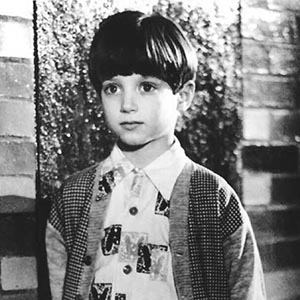
Michael Kaye
Writer/Director Barry Levinson closes out his Baltimore Trilogy with “Avalon,” a visually enchanting, magnificently assembled tale of the Krichinsky family over a period of several decades. Levinson beautifully captures the family’s journey to America as immigrants and the trials and tribulations they face in discovering America, economic success, and each other.
Aidan Quinn serves as the centerpiece for the action, and Levinson wisely allows the action to evolve essentially around his experiences in America, business and family. As Jules, Quinn is marvelous and reminds us why we ever hoped for his career to blossom. Quinn’s performance is one of great power and yet one also of great sensitivity.
It is this sensitivity that allows “Avalon” to stand out among films. Levinson, better than most American writers, captures the complexities of the male spirit and heart. Levinson’s male characters are never one-note. Instead, Levinson creates men of strength who are comfortable in their masculinity and, yet, also strong enough to care openly and expressively. Even in a film such as the nearly disastrous “Toys,” Levinson creates a character who is at once sensitive and child-like yet strong enough to confront the most dastardly evil. Levinson offers a refreshing spin on masculinity that I embrace and celebrate.
Quinn is surrounded by a family of solid performances including Armin Mueller Stahl, Joan Plowright, Lou Jacobi and Leo Fuchs. In supporting roles, Elijah Wood and Elizabeth Perkins shine particularly brightly.
“Avalon” remains visually mesmerizing throughout, however, the screenplay itself starts to falter towards the end of the film. In some ways, the messages of the film begin to overtake the characters and we are left with a film that becomes more an intellectual exercise than a celebration of family. This “soapbox” approach has plagued Levinson before and completely sunk the otherwise appealing “Toys.”
Yet, just when it appears that “Avalon” is destined to become lost the charm and beauty returns and we are allowed to again embrace the family we have grown to care about. The film is somewhat reminiscent of Jim Sheridan’s “In America,” a later film that much more successfully captures the spirit and heart of this time period and experience.
Visually stunning, occasionally frustrating but nearly constantly inspiring, “Avalon” is a film of beauty, simplicity and hope that will make you want to call up your parents and just say hello.
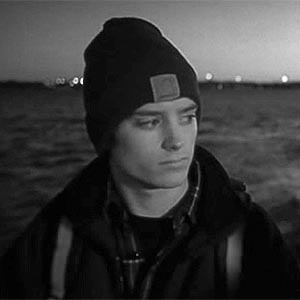
Wren
With an onslaught of race and ethnic-themed films at theaters, it’s often hard to tell which have serious morals and which are pure fluff driven by the traditional Hollywood economy. Black and White takes the former approach by asking serious questions about relations between African American and Caucasian populations in urban settings.
Several stories weave through this surprisingly short film (100 minutes wouldn’t seem especially brief, except that this film tries to accomplish an awful lot in that modest amount of time). The primary story centers on gang leader and soon-to-be rap star Rich (Oliver “Power” Grant) whose greatest ambition is to record an album to promote racial harmony. A second storyline focuses on a group of white high school students who imitate the hip-hop culture and end up involved with the third storyline; that of a documentary filmmaker (Brooke Shields) and her gay husband (Robert Downey Jr.) who want to examine the effects of hip-hop on white culture and the rationale behind the mimicry. Then there’s the story of a basketball player (Allan Houston) who’s asked to throw a game in exchange for a few extra bucks, and his girlfriend (Claudia Schiffer) whose Master’s thesis is more important than her relationship.
A bevy of talented and not-so-talented actors makes up this above-average ensemble that sometimes manages to keep us interested when the storytelling falters. Downey is a bit over the top, but Shields gives it her all as the feisty and pushy documentarian. Meanwhile, the actors playing the high school students have talent of their own. Most notable are long-time child star Elijah Wood, Eddie Kaye Thomas and Gaby Hoffman.
As for the film’s optimistic theme about racial coexistence, it’s difficult to buy the implication that hip-hop brings the races together. The impact of hip-hop is more than slightly exaggerated here; it simply doesn’t touch as wide a range of subcultures as the filmmakers seem to think.
Black and White is an interesting movie that tackles important social issues. However, the film drags too much to keep an intelligent audience interested long enough to fully grasp its message, and even if they do, it might not be convincing.
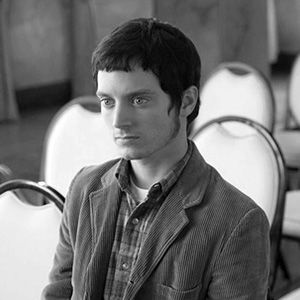
William Avary
Bobby represents this year’s most difficult film to view with an entirely open mind. The reason is of course, the eclectic and impressively star studded cast. On one hand, the amount of star power could distract you from appropriately feeling the adequate level of emotional impact. One the other hand, that same amount of star power might cause you to immediately love the film no matter how it turns out. I have heard mixed opinions about Emilio Estevez’s newest directorial offering. Occasionally, it is impossible to ignore the commercials and newspapers which advertise star ratings and quotes. If I can manage it, I separate myself from a situation in which I hear another person’s thoughts. Bobby is a mild success because of the sheer brilliance of the conclusion. It is so devastatingly poignant, so poetically beautiful, and so masterfully unified that the easily noticeable flaws do not seem so significant.
The day was June 6, 1948, and Robert F. Kennedy had just won the California Democratic Primary over Senator McCarthy. He was prepared to go head to head with Richard Nixon for the Presidential race in November, but that never happened. That day, Robert Kennedy was giving a victory speech at his campaign headquarters, located at the Ambassador Hotel, in Los Angeles. When he finished his speech, he proceeded to walk into the kitchen in the middle of a massive crowd. Suddenly a 24-year-old Palestinian, named Sirhan Sirhan, shot him multiple times. The man who very well might have been the next President of the United States, and a symbol of change in America, died 26 hours later. This story revolves around 22 people who were also present at the hotel the night he was gunned down.
It would take awhile to explain every sub-plot and every minute performance, so I’ll just insert comments of those that impressed me the most, and work my way through. Freddy Rodriguez is a dishwasher at the hotel that is angry because he will miss a Dodgers game with his father. Rodriguez proves to have limitless potential as an actor with this profound display. He gives the tickets to the chef, played by Laurence Fishburne, who never disappoints. Demi Moore is an aging drunken singer, whose marriage to Emilio Estevez is on the verge of collapse. If nothing else, this film shows that Estevez is still a fabulous actor. William H. Macy is the hotel manager, and he is married to Sharon Stone, who works as the head stylist. Macy is having an affair with a switchboard operator, portrayed by the gorgeous Heather Graham. Macy is among that group who are the most consistently compelling, yet under appreciated performers in Hollywood, and that stability persists in Bobby. As a whole, Sharon Stone and Demi Moore did not overly move or shake on screen, but the scene they execute together is incredibly intense and mesmerizing.
Christian Slater is the Food and Beverage Manager, who has just been fired by Macy because of his mistreatment of Hispanics. Slater possesses one of countless supporting roles, but he has not been this stirring in many years. Helen Hunt is married to Martin Sheen. Their relationship struggles due to Sheen’s depression. Ashton Kutcher, Shia LeBeouf, and Brian Geraghty contribute one of the most bizarre drug sequences in cinema. Kutcher is a dope dealer that introduces them to LSD. All in all, Geraghty and LeBeouf make a humorous, yet intriguing pair of campaign helpers. Lindsay Lohan is planning to wed Elijah Wood, in order to prevent him from being shipped to Vietnam. I found this to be my favorite storyline as both Wood and Lohan lend gripping work. Finally, Anthony Hopkins is the old hotel doorman, who is playing his regular game of chess with Harry Belafonte. Surprisingly, this was the worst sub-plot. Hopkins is no doubt a legend, but watching these two carry a conversation over chess was quite dull.
The directing resume of Emilio Estevez is not filled with awards and nominations, but Bobby at least expresses his heart, determination, and concern as a filmmaker. The structure is a mess at times, and even though it is not as organized as any Altman pictures, or other hyperlink styles in film, it still holds its own eloquent identity. Estevez is said to have had a horrible case of writer’s block when trying to complete this script. It took him seven years to finalize. He should be grateful that his brother Charlie Sheen convinced him to finish, because the resulting screenplay is quite magnificent in almost every way. Not one character takes a lead part (except for RFK), but each person has moments that are indelible, and momentous. I do not agree with anyone who states that Estevez was striving for a grand epic on the scale of Titanic. True, the cast is nothing but mainstream names, but it should be obvious that most of these folks have connections to the director. I believe they enjoyed the script because of the subject matter, and further wanted to supply parts because of who was behind the camera.
A couple scenes were filmed in the remaining wing of the Ambassador Hotel, which was all but demolished during filming, but the areas that were recreated were done so with such fascinating accuracy and attention to detail. If you spot any flaws between the staged set, and footage of Kennedy’s last speech, you’re nuts. In addition, the soundtrack was impeccably selected, especially the track “Never Gonna Break My Faith”, performed by Aretha Franklin and Mary J. Blige.
The title deserves some discussion. It is the only other problem I had with the film. The majority of people all over the world know of this man as Robert Kennedy, but the title of this movie is Bobby, and I felt that we should have gotten to know him as “Bobby” a bit more. I must also say that it was wonderful that the story primarily touched on his importance to others, but I wanted to experience the man behind the podium. The decision to only show RFK through historical speeches, and/or from the back was shrewd, but exposing some private thoughts of RFK from someone would not have overstuffed the running time in my opinion. It would have made it stronger.
All of these storylines intertwine deftly with sporadic shots of television appearances by RFK. He was wisely not cast in the film, and instead the utilization of real footage meshed brilliantly with the staged performances. Even after Good Night, and Good Luck, Syriana, and Nashville, Bobby’s passionate and honorable message has so much significance in today’s world. The meaning presented here speaks to every generation, every race, and every sex. We will never know what the world may have been like had RFK lived on, but it most certainly makes us think long and hard about it. RFK was the last shred of optimism for many during that time period, and Bobby marks a fitting tribute to his desire, his legacy, and his ambition.
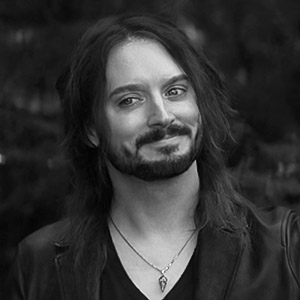
Strawn Wise
A quirky Kiwi misadventure is the basic foundation of Bookworm, director Ant Timpson’s impressive follow-up to his much darker first film, Come to Daddy. He brings along the star of that movie, Elijah Wood, into this enjoyable tale, which finds two souls in flux and hoping to find lighthearted resolution in their lives.
Meet Strawn Wise (Wood), a washed-up American magician/illusionist who returns to his young, estranged daughter Mildred (Nell Fisher) during a time of crisis. Raised by her financially strapped mom, Mildred has been immersing herself in lavish literary adventures, and now, when life has become most challenging, she wants to go on a real one. In the New Zealand wilderness, in fact, and perhaps with her befuddled pops. The mission: to discover a mythical black panther.
There’s enough in that premise alone to attract audiences of all kinds, but thanks to the taut script by Toby Harvard, which never meanders too far, the film is a joy. With breathtakingly scenic New Zealand on display, and fine performances from the film’s leads, Bookworm is an instant crowd-pleaser, serving up just as much heart as it does adventure and intrigue.
Actor Elijah Wood isn’t the only person here to work with Ant Timpson again. Screenwriter Toby Harvard penned Timpson’s previous works, Come to Daddy and The Greasy Strangler, and director of photography Daniel Katz was also on board Come to Daddy. These comfortable behind-the-scenes connections make a great difference on screen in an outing that feels smooth and well-delivered all around. Think of it as the director’s “love letter” to ’70s and ’80s family flicks where the adventure presented was a big selling point — Swiss Family Robinson and The Adventures of the Wilderness Family, with just a tad more of a modern edge.
In Bookworm, Mildred has long dreamed of finding proof that The Canterbury Panther exists. Considered a mythological beast, she knows better. If she finds proof, there will be a hefty financial reward. Surely, that will alleviate her mom’s financial struggles. There’s a sudden rush to actualize that dream when her mother falls ill, and a stranger shows up on her doorstep. That’s Daddy Strawn. Long absent trying to fulfill his own dreams of becoming a renowned American illusionist, he’s since been reduced to making balloon animals at celebrity birthday parties. Oh, that eyeliner and long mane — Strawn has become a caricature of himself.
It’s the perfect unlikely-couple set-up, and soon the two are forced to bond as Mildred takes command and leads the duo through the New Zealand wilderness. But it’s not the beasts of the wild they’ll need to worry about. That’s a good secret to keep for now. You’ll know when you experience it, and it sends the direction of the film in a vibrant direction, upping the stakes if not the survival of our key characters.
You can always judge a good movie by how much you end up caring about the people you’re watching on screen. To that end, Bookworm succeeds. Strawn and Mildred are easy to like and their misadventures fun to keep track of, even when the over-explaining from Mildred goes a tad too far. Wood and Fisher make a great pair and elevate each other’s performance.
Bookworm also stars Michael Smiley and Vanessa Stacey, who play Arnold and Angelina, respectively. The hiking duo pop up on Strawn and Mildred’s adventure and figure prominently throughout it. Smiley, in particular, stands out here. The actor turned heads in films like The Lobster, The Other Boleyn Girl, and the hit Apple TV+ series, Bad Sisters. His comedic timing is greatly utilized throughout these vital scenes.
As for Wood, you tend to lose yourself in his hypnotic performance. Maybe it’s the long hair and make-up, but there’s something both oddly sexy and disturbing about his character. You can see the man he once was, or at least thought himself to be — a kind, Criss Angel-adjacent illusionist who’s quick with the hand and whose wide eyes enchant you. Wood and Fisher make a fine pair, and it must be said: Stay on the lookout for Fisher. Based on her wise-beyond-her-years vibe and her bright spark, you can see this actress eventually winning big awards someday. We felt as if we were watching a young Maggie Smith by way of a girlish Cate Blanchett. You wouldn’t want to cross this one.
The other grand star of the film is New Zealand herself, spellbinding all around and extremely captured here. Talk about a sense of place. Thematically, this film becomes a tale of understanding and forgiveness, but the filmmakers side-step any kind of gooey hugs-save-the-day mentality. There’s some extra pep here as the ominous panther figure lingers through the story. It’s a great mix of adventure and heart. If you appreciate parent/child misadventures, the film will surely entice you. It can charm the socks off you in the vein of Definitely, Maybe, Captain Fantastic, the brilliant Eighth Grade, and the best of the best, 2006’s Little Miss Sunshine. Fun, sharp, and spirited, Bookworm might capture your heart.
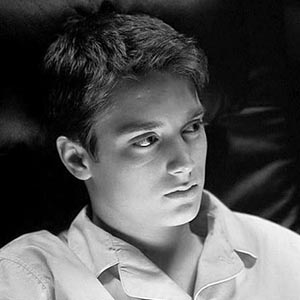
Barney Snow
“If you could let go of your past, to have a future, would you do it? Well, that’s what I did. Now this is my life.” That is the premise of The Bumblebee Flies Anyway as stated by Elijah Wood’s character, Barney Snow. A soft, almost passive film, Bumblebee challenges us to follow a shadowy figure as he builds a new life through new acquaintances in the confines of a Research Institute, where hope for the future is based on the demise of the participants. In many ways, this premise is depressing. But, the focal point of the film is the one character, Barney Snow; and he’s in good hands with Elijah Wood as pilot.
The film has a small population. A kidney diseased smart-alecky African-American kid who is mature beyond his years and as warm and outgoing as Barney is empty and introverted, is played by George Gore II. His performance is an important foil to Elijah’s doe-soft Barney Snow and only fades appropriately when the real Barney is resurrected. Joe Perrino, as the acidic Mazzo, turns in a fine performance developing the character from the scared tough kid to the brave suicide. His scenes with Barney are pivotal. His sister, Cassie, played by Rachael Leigh Cook, makes for a fine lever to melt Barney Snow and capture his flame and his blooming teen heart. Janeane Garofalo manages to fill in the cracks with her stoic performance as Dr. Harriman. She’s a bit sleepy in the part, but it blends into the overall dreamlike state we feel with all the characters, except Barney.
Barney Snow is a perfect canvas for Elijah Wood. It allows him to invent a person on screen for us, to present us with just a little, then some more and more, in a crescendo of revelation. As in films like The Ice Storm and the future Eternal Sunshine of the Spotless Mind, Elijah Wood demonstrates how the super-star of The Lord of the Rings can project powerfully using minimalism. I have tried to imagine several young actors in the role of Barney Snow and none could have cut the mustard. They would have put us to sleep. The Bumblebee Flies Anyway is about Barney Snow; one character with a little help. I think Elijah Wood takes his queue from the title. By rights, this novel as a film should not Fly at all. Its wing span is too short and its plot line too shallow. But it does, because Elijah is the Bee, and he knows precisely what it’s about and how to craft it into our memory.
This film, this quiet little film moves. It touches the heart like few films I have seen. It’s an honest representation of its simple, unlikely premise carried full circle. It will uplift you and stay with you. You will watch it twice, and it will ripen a few more notches with the second viewing. For Elijah Wood fans, it’s a must. He is in nearly every scene (unusual for any star) and he reveals a bit of skin for his adoring public. In any event, a film whose premise can be summed up in a single sentence, and might not be able to get off the ground even if shot from a canon, soars because Elijah Wood Flies Anyway.
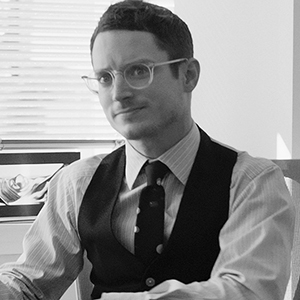
Scott
Like the indie (and personal) darling from 2009, 500 Days of Summer, Celeste and Jesse Forever is quirky and comedic, but at the end of the day, honest and relatable look at an offbeat relationship. And while it’s going to take a lot to trump Tom and Summer in my mind, Celeste and Jesse are quite the charming couple, despite their supremely unusual situation. The new film, which had its world premiere at this year’s Sundance, is a touching, sweet, and absolutely hilarious dramedy that fulfills all the requirements of the genre. Relatable characters, smart dialogue, and genuine emotion. This one scores with flying colors.
Celeste and Jesse are the perfect couple. They complete each other’s sentences. They have a delicious rapport. They have this little thing that they do where they pretend to masturbate a small tube of cream, resulting in.. well, you get the idea. They spend all their time together. So why are all their friend’s creeped out? No reason, just that Celeste and Jesse are getting a divorce.
Now that’s a clever premise if I ever did see one. We aren’t clued into the fact that marital problems have arisen until about 15 minutes in, and it’s a genuine surprise, because the two of them are so frigid’ good together. The script, written by Rashida Jones and Will McCormack, finds the perfect balance between raunch and pathos, creating something that seems familiar, but ultimately transforms into something special and refreshing.
And damn, do the cast members knock it out of the park! Jones plays Celeste, and utilizes her impeccable comedic timing, as well her strong dramatic chops, to great effect. Her counterpart is Andy Samberg, playing Jesse like the most complex SNL character ever. Samberg hasn’t really ever had a chance to flex his dramatic muscles, but he displays a confident touch, and creates a character worth celebrating. McCormack is hilarious as Celeste and Jesse’s pot dealing friend, and Emma Roberts offers up some inspired lunacy as an obvious parody of all things Ke$ha. And Elijah Wood is pitch perfect as Celeste’s business partner who is trying way too hard to advertise that he is gay.
Under the watchful eye of director Lee Toland Krieger, Celeste and Jesse Forever is something really wonderful. At times gut bustingly funny, thanks in no small part to Jones and Samberg’s infectious chemistry, and at times very difficult to watch, it perfectly walks the tight rope between full on comedy and full on drama.
This is one you shouldn’t miss! Also, the soundtrack is awesome!
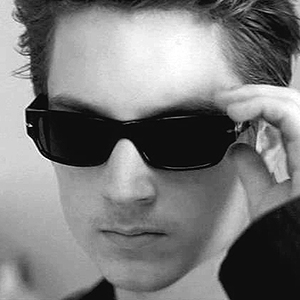
Mikey
Recap: Kresk, (Steve Zahn) struggling barber, recently divorced by his wife stumbles upon a secret when a gangster comes into his barbershop. This gangster, Avnet (Jeff Goldblum), was involved in a high profile theft last night involving three ancient Chinese coins. He thinks Kresk must die, fortunately for Kresk, Avnet stumbles and get Kresk’s scissor in his neck. Now Kresk has a body to take care of. Unfortunately for Kresk, Kresk is not the brightest boy in town. And worse, neither is his friend Andy (David Cross), full time scout, who he enlists for help. But as time goes, and things get worse, more and more people get involved, but Kresk is determined that those coins will change his life. For the better, he hopes.
Comments: An unusual comedy/crime movie handling a lot of different subplots that runs at the sides of each others with a lot of intersections. What makes this unusual and imaginative is that what happens in a subplot we are not currently following has an impact how the story goes at the next intersection. At the same time we get the full coverage in time with a frequent use of flashbacks and jumps in the timeline. Still, it was never any problem to follow.
The movie has a really big cast, and a lot of the names on the list are known. Goldblum delivers a solid performance as usual, Zahn is a great choice for Kresk. The best impression however I think I got from Elijah Wood (Mikey) who portrays a teen hit-man with finesse. I think it is the best performance from him I have ever seen. The director team Traktor has done a great work in their movie debut and I hope I will see more work from them like this one.
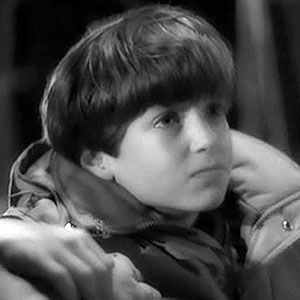
Luke Winfield
Eight year old Luke (Elijah Wood) was out with his father to get pizza when they stopped by his father’s office to pick something up only for there to be trouble and his father murdered. Refusing to leave his father’s side Detective Bass (Tom Skerritt) calls for a psychologist to help and Dr. Jackie Hollis (JoBeth Williams) arrives. Having managed to persuade young Luke to let go of his dead father and tell the cops what little he knows Jackie finds herself forced to assist Bass in the case as it appears that Luke knows more than he is saying but using a defense mechanism of Captain Hook and Peter Pan to deal with the stress of what he saw. But as Jackie manages to unlock the secrets which Luke holds she begins to fear she could be the next to be murdered.
Let me break “Child in the Night” down to its two parts starting with the relationships. On one hand we have this interesting relationship which forms between Jackie and Luke as she sets about gaining his trust in order to unlock the secrets of his mind hidden behind his seeming fascination with Peter Pan and Captain Hook. It is not only nicely acted by JoBeth Williams but also by Elijah Wood who seems to have a ridiculous amount of talent for such a young child. Then there is the inevitable relationship which forms between Jackie and Bass and whilst Skerritt plays his part nicely, starting of as antagonizing but showing his character’s softer side as he develops it is unfortunately a cliche.
That brings me to the mystery as we have what happened in the office that night. Now on one hand you are intrigued to work out who the killer is and why young Luke is unable to deal with what he saw in a normal way. But on the other hand you can assume from the word go that Jackie is not only going to end up in a relationship with Bass but also end up in danger when she gets close to the truth of what happened as well as why. In truth whilst I enjoyed the mystery of it all and accept that some times cliche is needed so that a movie isn’t too taxing the familiar aspects which fill “Child in the Night” kind of drags it down. Not only that the character of Bass is a lover of old Bogart movies and some times the dialogue seems like it is trying too hard to sound inspired by older movies.
And that is the thing about “Child in the Night” as it is a made for TV movie and as such features all those things which hold it back from being more original. The styling, the dialogue, the characters and the camera work it is all typical of a made for TV movie from back in 1990. In fairness TV movies especially thriller from the 1990s are generally better than those made today but still the sense of familiarity which engulfs this is a draw back.
What this all boils down to is that in part “Child in the Night” is good, it has mystery and is nicely acted. But it is a TV movie and features not only a familiar style but also familiar elements from characters to subplots which hold it back.
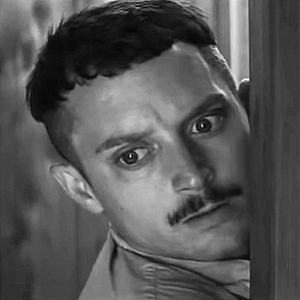
Norval Greenwood
COME TO DADDY is the feature film directorial debut from acclaimed producer Ant Timpson (The Greasy Strangler, Housebound), with a script penned by Toby Harvard (The Greasy Strangler), about a man who goes and visits his estranged father. The film stars Elijah Wood, Stephen McHattie (300), Martin Donovan (Big Little Lies), Michael Smiley (The Lobster), Madeleine Sami (Breaker Uppers), and Simon Chin (Killing Eve).
Norval Greenwood (Elijah Wood), a privileged man-child arrives at the beautiful and remote coastal cabin of his estranged father, who he hasn’t seen in 30 years. He quickly discovers that not only is his dad a disapproving jerk, he also has a shady past that is rushing to catch up with him. Now, hundreds of miles from his cushy comfort zone, Norval must battle with demons both real and perceived in order to reconnect with a father he barely knows.
I’ve watched a lot of horror/thrillers in my 35 years on this planet and though I’m no expert by any stretch of the imagination, I can usually tell where a movie is headed rather early on. In the case of COME TO DADDY, not only could I have been further from the truth in where I thought this movie was headed, but it’s easily one of the fucking wildest movies I’ve seen in 2019. Because I believe in the sanctity of not spoiling anything, this review will be light in terms of the overall premise of what unfolds during the film. What I can say is that if you ever thought you had daddy issues, they are nothing compared to Norval’s.
I immediately resonated with this film after reading Timpson’s statement on how the idea came to be. After losing his father, he went through an exploration of what could potentially be the darker side of his father’s life. Having lost my own dad 18 years ago, I felt a kinship to what Timpson was conveying, especially when it came to light that my father had been hiding some unsavory aspects of himself from me and the rest of my family. Had he been alive today, I can almost guarantee we would be estranged which is why I figured this movie would tug on my heartstrings. However, I was not prepared for the onslaught of twists and turns that unfolded, resulting in a film that was more about Norval’s growth (in a bizarre series of events) than that of his father.
Taking on the brunt of the film’s performances is that of Elijah Wood. Dressed in hammer pants outfitted by a flowing tunic while carrying a rose-gold limited edition cellphone created by Lorde, Norval is the epitome of white male entitlement. We later come to find that he’s still living at home with his mom while attempting to make his career in the “music business” sound much more glamorous than it really is. Wood does a tremendous job of not only carrying this movie but making it feel so believable and genuine. Even when he learns just how much of an asshole his father is, you can still see him struggling with wanting to be accepted and loved by him.
As for Timpson’s first feature film, he knocks it out of the park, especially if you like films that are weird and twisty turvy. I can only imagine how cathartic this must have been for him, to be able to make a film both in remembrance of his father and as a way to work through any unfinished grief/guilt/whatever you want to call it. The whole film plays out seamlessly and I think a lot of that has to do with the players involved, especially Timpson, Wood, and writer Toby Harvard, all of whom worked on The Greasy Strangler together. That’s not to say that the film doesn’t have a few bumps in the road, it most certainly does, but it is easier to disregard them when viewing the overall picture.
Honestly, COME TO DADDY is one of the best debut films I’ve seen in 2019. It’s incredibly surprising, shockingly funny, and ruthlessly violent (listen, someone gets stabbed in the penis and it’s worthy of praise). It’s a movie that may make some audience goers uncomfortable due to the weird mixture of humor and violence and, to be quite honest, I think that’s great. For me, this is a film that will definitely hold a special place in my heart as it is a reminder that our parents, those who we hold in such high esteem, have the ability to make awful mistakes with dire consequences because after all, they are only human.
This is a movie that you should go into as blind as possible, and then do your movie friends a solid and don’t ruin the surprises in COME TO DADDY.
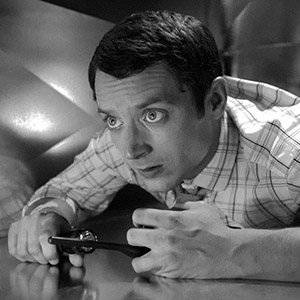
Clint Hadson
Kids are the future they say – but that couldn’t be farther from the truth in the wickedly irreverent Cooties. Born from the warped minds of Saw’s Leigh Whannell and Glee’s Ian Brennan, their latest project is an absurd twist on the zombie genre, one in which kids could possibly mean the end of the world. If Dawn of the Dead were about a crew of misfit teachers trying to survive a grade school zombie apocalypse, you’d get this film, a witty addition to the genre that’s as funny and brutal as can be. It never shies away from any opportunity to milk its twisted premise, yet always does so in inventive ways. Anchored by a literally killer ensemble cast, the film is a crowd pleaser from start to finish, sure to amuse veteran gorehounds and casual horror fans alike.
The story begins with a budding writer named Clint (Elijah Wood), who’s moved back into his childhood home and picked up a summer gig as a substitute teacher. On his first day on the job, he reconnects to a old friend and a colorful mix of characters who comprise the teaching staff at a small elementary school. Unbeknownst to anyone, their day is about to get a whole lot rougher, thanks to an infected chicken finger which turns one unsuspecting little girl into a feral host bent on spreading her vicious disease to everyone on the playground. As the school’s kids turn homicidal and the blood begins to flow, the unsuspecting band of teachers are forced into an uneasy alliance, doing anything in their will to figure out what’s happening and just maybe, survive the night.
Most surprising about he film is the way it balances a slew of disparate tones, playing with genre conventions but never becoming a slave to them. The more “zombie” films we get, the more they feel the same, and yet this one escapes the genre’s trappings by focusing on its colorful characters and finding ways to continually push them into situations that are simultaneously funny, unpredictable and shockingly gory. Fitting everything in from an icky autopsy to a suiting up montage, the film stays light on its feet but plays everything refreshingly straight, never winking but finding genuine comedy from the absurdity of what’s on screen. From the gruesome kills (there are tons of memorable ones), to the relentless pace, there’s never a dull moment or much that’s wasted about the film in general.
If there’s a reason to watch the film besides the blood and guts, it’s the cast, who each carve their own niche among the film’s misadventures, each getting their own chance to shine. Elijah Wood’s meek but well-meaning Clint headlines the cast as the unsuspecting hero who has to rise to the cause. For Wood, the film marks yet another diverse turn, playing a grounded everyman stuck in an extraordinary situation. Rainn Wilson’s Wade is more or less is the darkest timeline version of what we’ve come to expect from him: half jerk, half vulnerable misanthrope, he has his place. Jack McBrayer, Alison Pill and Nasim Pedrad round things out, used sparingly but always when they’re needed most. If there’s someone who rises above and steals every moment he’s in however, it’s writer Leigh Whannell who joins in on the fun as the socially inept Doug. As someone who just blurts out his raw, unedited thoughts, everything that comes out of his character’s mouth is gold, delivered with perfect deadpan timing – he gets a lot of the film’s real zingers, driving everything over the edge when you least expect. Together, this diverse set of performers and characters are irresistible to watch.
Cooties is one of those films that you’re surprised didn’t happen sooner, a throwback to the 80s horror films of yesteryear which were all based around the silliest kinds of pop culture references. But hey, it works out great here, thanks to the inventiveness and strong vision of directors Jonathan Milott and Cary Murnion. The film smartly plays things a bit broad without sacrificing its niche appeal, and because of that, it’s bound to connect to a wide audience looking for nothing more that a perfect blast of escapism with just the right amount of story and character. In a world where zombie films and shows are ubiquitous, this film is the cure to genre complacency. Better than pastiche, and with smarter humor than most comedies, you’ll laugh, you’ll cringe and at the end, you won’t regret any of it.
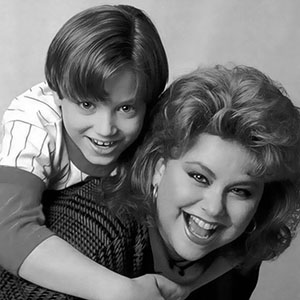
Day-O
This is another early-1990’s made-for-TV movie, which means both money and time for production were short. But I think it fares well because it seems to recognize the limitations of the genre and doesn’t try to be anything other than it is. It’s a comedy, but not a slap-stick or laugh-out-loud one, with just enough heartwarming “awww” moments added. The story is predictable, and the main antagonist sees the light a little more easily than seems plausible, but this isn’t meant to be high drama. All the characters, including the main ones, are broadly drawn, and the minor ones are basically “types” who fill their necessary slots in the story. Even so, I think we get some insight into Grace (Delta Burke), and the least stereotypical character is probably her husband, Ben (Charles Shaughnessy), who’s not as easily labeled as most of the characters are.
Another drawback of the genre, is that these movies tended to get dated very quickly. Day-O fares better here, too, because the issues are more universally human and also, I think, because of the flashback scenes, which keep us from getting too rooted in 1992. But the fashions and other details (an umbrella baby stroller!) can’t help but evoke the time.
Elijah Wood plays Grace’s imaginary friend, Day-O, whom we first meet in flashbacks from her childhood 30 years earlier. He turns up again at a time when her life seems to be going out of control and she’s anything but happy. Of course (and it is quite “of course”–that is, predictable), he reminds her of all the important things that a person in a movie like this needs to remember, and helps her gain confidence in herself. The comedy comes from the reactions of people who can’t see him (every adult but Grace), and from his own reactions to modern life after being out of circulation for 30 years.
Day-O, besides being imaginary, is a happy, confident kid, who’s all boy but wise beyond his years. Sound familiar? If there’s any movie in which the character inhabits Elijah instead of the other way around, this could be it. Not that that’s a bad thing. It’s fun watching him be himself, and catching little flashes of who he’ll be in the future. It was the experience of making this movie that led Delta Burke to predict that Elijah was going to “own Hollywood” someday. Happily, owning Hollywood doesn’t seem to be something Elijah particularly cares about, but her point is well taken. “Someday that kid will be a heart-breaker,” is another prediction that could easily have been made from this movie (and probably was, more than once).
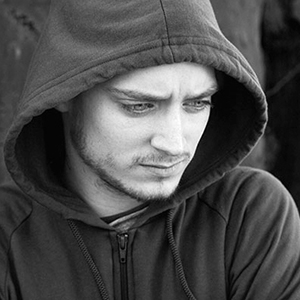
Aaron Feller
I think the only thing more terrifying than continuing the war in Iraq is the idea of the government reinstating the draft in order to wage it. It’s bad enough that there are loyal hard working Americans who are willing to voluntarily fight and die for big oil interests and the George W. Bush’s of America; but to steal an innocent man’s liberty and freedom from him and force him to kill and maim and invade other people’s countries without question is so un-American, it’s petrifying.
Day Zero is a fantastic film that unfortunately due to its small release a lot of people won’t see, a film that I myself almost missed; but it’s something that everyone, particularly we twenty something’s of the world, should see.
Set at some point in the near future after another terrorist attack has claimed the lives of thousands in Los Angeles, we are still at war and our enemies around the globe are increasing not decreasing. It’s here that the film puts us smack dab in the middle of the question, what would happen if suddenly all healthy heterosexual males in this country from ages 18 – 35 were eligible for the draft? It forces us to ask ourselves, not only if I fall in that category how would I react, but also to those of us who don’t, what does that make us? Are healthy gay men and women of either sexual orientation somehow less responsible for safe-guarding America?
It would be incredibly easy to tell this story from one point of view or the other. Either it’s a pro war film or an anti war film. But what Day Zero brilliantly does is it avoids taking sides by simply stating – we’re at war, this is the reality, how do we deal?
Chris Klein, Elijah Wood and Jon Bernthal play three friends in New York City who couldn’t be more different from one another if they tried. The only thing that they share is this amazing bond of friendship that keeps pulling them back together. Klein’s character George is the lawyer son of a wealthy influential business man, Elijah’s Feller is a vagabond writer with seemingly no family and a host of phobias and Bernthal’s Dixon is the hard luck case fighter from the streets whose ability to beat the hell out of people is matched only by how fiercely loyal and protective he is of his friends.
When all three simultaneously discover that they’ve been drafted each deals with it in his own way. They all, however, have to wrestle with and conquer their demons before their 30 days is up and they have to either report for duty, or head for Canada.
The character development that takes place in this short 96 minute piece is really remarkable. Chris Klein in particular turns in what I believe to be the performance of his career. For anyone who still thinks he’s just the pretty but dumb jock, this film is proof that he’s far deeper and far more talented than anyone thought. Don’t get me wrong, he’s still gorgeous to look at, but there’s much more than meets the eye here.
After the crazy amount of success he enjoyed from “those” movies, I’m sure Elijah Wood has no need to be working on anything else, which is why this small budget indie with a truly challenging role must have appealed to him. I was completely weirded and a little creeped out by him by movies end; which is really saying something because normally those baby blues are nothing but cute, in Day Zero cute slowly turns into bizarre and bothered.
I haven’t seen much from Jon Bernthal aside from some guest spots on a few of the Law & Orders but he does a solid job here as the guy you most want on your side in a fight, but who doesn’t really enjoy his talent for hurting others. If people in the industry do get to see this, I’m sure he’ll be popping up on the radar a little more often now.
It seemed as though the film was shot entirely on location here in New York City, which is always a plus in my book. The authenticity of the location permeates the story telling giving it that added credibility necessary when posing these types of questions.
By no means an expensive film to make, Day Zero is an honest movie that asks a lot of its audience, but that also makes good on its intentions to make you think and consider new possibilities.
If you’re someone who enjoys the type of movie that actually makes you think and feel something to the point where when it’s over you have to talk to someone about it, then skip the latest $100 million movie at the multiplex and go see this instead.

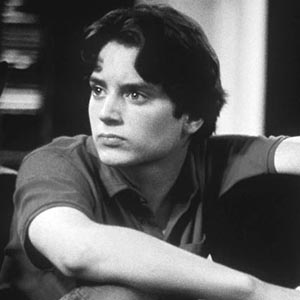
Leo Biederman
“Deep Impact” is the first in a long, long list of massive summer extravaganzas. And while I have yet to see them all (and the little independent films that get shuffled off to the minute smaller screens of my multiplex), “Deep Impact” sure looks like its going to be one of the best. “Deep Impact” has some of the most jaw-dropping effects ever put down on film, and it even has a serviceable story and decent characterization. You actually care about what is going on in “Deep Impact”, even though you didn’t pay your money to see that.
The film begins with the discovery of the comet, which is made by a young kid (Elijah Wood) and then confirmed by an astronomer at an observatory. He is killed by a semi-truck, and so time goes on until the comet is discovered again by a newswoman (Tea Leoni).
The comet is on exact course for earth; the size, as told by the president (Morgan Freeman, in a surprisingly good turn), “The size of Mount Everest”. So what will happen? It could hit and no life will be spared (except for the million people put in underground caves) and the world will be doomed, or the comet could miss the earth.
The film partly wastes itself with the plot, which focuses on several groups of people: Elijah Wood and his girlfriend (Lelee Subleski) who get married so they can get into the cave; Tea Leoni and her divorced parents (Vanessa Redgrave and Maximillian Schell); the drilling team that failed to detonate the comet (and instead blew it in half), and others. The panic scenes also seem rather silly, especially a shot which shows a gridlocked highway (although I have no idea how long that took to set up).
Still, the emotion of the characters were very good, especially when the fate of the world is known. One of the film’s most powerful scenes shows the president, eyes wide, telling the country the news. Even the acting is good, especially in Robert Duvall’s (as the leader of the spaceship) quieter moments, and especially Elijah Wood, a promising face to the future of film.
The horror of some of the visual effects took me over, however. I will not go into detail about such events (since they do happen around the end). Some of them are the most gut wrenching images I have ever seen, some of which I don’t even know how they did, all thanks to director Mimi Leder.
I just wish some of the rough areas were taken care of however, story wise and action wise. You’ll know what I mean when you do see the movie, which I do recommend you do. I have yet to see how “Armageddon” competes to this film (there is a good chance that the two will run at the same time), but I prefer good emotion and terrific special effects to 13,000 shots a minute by the Bruckenheimer company.
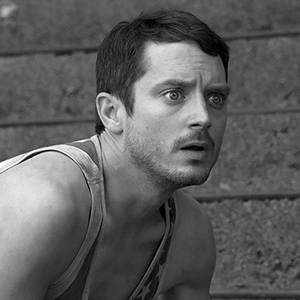
Todd Brotzman
Dirk Gently’s Holistic Detective Agency is one of the greatest shows I’ve ever seen. It has everything I like: clever mysteries, supernatural elements (like time travel, soul-swapping, alternate dimensions, and dreams that become real), as well as emotionally-vulnerable male characters, relatable, strong women with huge, world-saving plotlines that are all their own, lots of danger, intrigue, and an astoundingly high amount of hope and fun. Every second of this show feels like a celebration of being alive. It is both comforting and exciting to watch.
Furthermore, you really see how brilliantly made it is when a season is viewed in its entirety. There are NO plot holes. In episode one, you’re introduced to a world that seems in utter chaos: hard to understand and somewhat alarming. A murder has occurred, one with supernatural elements, and Elijah Wood’s character, Todd Brotzman, unintentionally discovers the room where it took place. His life having been dull and uninteresting up until this point, he is particularly startled when, upon leaving the room, he comes face to face with a man who looks – and, indeed, is – himself, but from the future.
The encounter lasts only seconds, enough time for Todd to try to convince himself he only imagined seeing his apparent doppelganger, but then Dirk Gently, a man he’s never seen before, breaks into Todd’s apartment to ask if Todd’s life has suddenly experienced “an unusual acceleration of strangeness as of late,” and the plot skyrockets forward from there. So many strange and wonderful things occur that I have not seen in any other show, but somehow make perfect, ultra-clear sense by the finale. It’s a very Douglas Adams-inspired method of summary: to throw forward a lot of elements that seem at first unconnected, only to reveal by the end how utterly tied to each other each element truly is.
Dirk Gently himself is truly a marvel, and is destined for a spot in our cultural history. He is energetic, kind, brave, and utterly human, but is also connected in a way even he doesn’t understand to the will of the universe itself. It is this unspoken, universal force that leads him via “hunches” to the cases he alone can solve. Usually, these cases are dangerous, supernatural, and fascinating. It is because of his apparent (though unconscious) connection to the fabric of reality itself that Dirk Gently has spent most of his life in various states of isolation, thrown from one corner of the world to the other in pursuit of saving people who he knows he alone can save. This has led to him feeling quite lonely, despite his obvious care for the well being of others, and it is one of one of the series’ most emotionally resonant traits to watch as this vulnerable, kind and wonderful person makes friends for what might actually be the first time in his life. This show will appeal to those who have felt alone, left out, or been outcasts in any way, because it soothes the loneliness in one’s soul, while also giving hope for a better, less lonely future.
Brilliantly creative and engaging, the cast is led by the ever-captivating Samuel Barnett, absolutely iconic Elijah Wood, charming and relatable Hannah Marks, and the beautiful and talented Jade Eshete, as well as a wealth of other diverse, incredible talents. It’s an ensemble show, meaning that even though Dirk Gently is the only character directly referenced in the title, every single character has a rich, expansive plot of their own. I particularly enjoyed Mpho Koaho’s role as Ken, who is by far the character who offers the series’ largest evolution. Wynonna Earp fans will be delighted to find Michael Eklund bringing an incredibly distinct physicality to his role, and Supernatural fans will adore the quirky, upbeat talents of the imitable and lovely Osric Chau.
There are so many stars in this cast, and this leads to falling so easily in love with every character, as though they are your own friends. The depth of their connections to one another is rewarding and obvious: you really get the sense that all of these once-lonely people were meant to meet each other, which ties in well with the show’s overall theme of “everything is connected.”
Season 2 makes the show even better. Season 1 was largely not romantic, with each character so wonderfully allowed to have important, amazing lives without any forced romances. In season 2, a little bit of romance does appear. A gay couple is introduced who absolutely adore each other, and this diversity is so wonderful to see because there is no accompanying homophobia anywhere at all in the plot: not from any other character, and not from anything else, not even implied! They’re simply in love, and no one minds. To have a glimpse into a world in which this is so normalized is healing, and I really think more shows should follow suit. We don’t need to keep replaying tragic plotlines for diverse groups of people. We can create hopeful narratives, too! Dirk Gently’s Holistic Detective Agency is far ahead of the times here. Season 2 also has a bisexual character – one who VERBALIZES being bisexual and is never looked down on for it, or even questioned about it — who is so easy to adore.
On a personal note, I really do think it was the introduction of these characters who helped me convince certain members of my family that diversity is a good and positive thing, for the show itself already had my family engaged and happy, so every other thing added to it was something they eagerly accepted. This means a lot, to many. A show that has that kind of power, and uses it in the pursuit of helping the world become more accepting and kind, is important.
Truly an incredible show for binging, I’ve watched this in large groups of people so many times. There is a social element to this show – perhaps stemming from its themes of unity, connectedness, and belonging – that resonate with a lot of people.
~Dusty Thorne
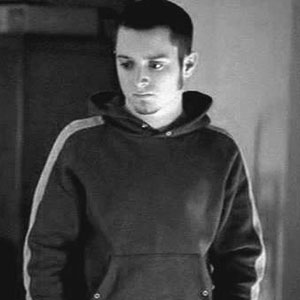
Patrick Wertz
I had felt for a long time leading up to seeing this film that I was going to love it. I’m not one hundred percent sure why. Perhaps it was because I knew it was written by Charlie Kaufman, the man behind Being John Malkovich and Adaptation, both of which I loved. Perhaps it was because I knew Kate Winslet’s character had the same name as my first ever crush, and a similar affinity to bright colours. Perhaps it was because of the geekishly cool trailer music – I don’t know. But I do know this: I wasn’t wrong.
Eternal Sunshine has proved something about Charlie Kaufman. It was already widely accepted that he was a genius, demonstrated by his ability to tie our brains in knots with his screenplays, namely Being John Malkovich. But it is now clear that he has a heart too.
This is the most touching, intimate and moving film of the year so far. From the opening scenes in which Joel and Clementine meet and fall in love, through to the very last shot, the film retains a sense of wonder in the relationship of the two leads. The moments of joyful affection are constantly juxtaposed with moments of anger and resentment, making them all the more wonderful. And similarly to Lost In Translation, which I reviewed earlier this year, this is a film which shows us that the leads are in love without having to show seduction or sex – a beautiful rarity in new films these days. Enough are simple moments like Joel and Clementine lying side by side on a frozen lake, and a line that, I feel, perfectly sums up the emotion of being alone and carefree with someone you have the greatest affection for – “I could die right now, Clem. I’m just… happy. I’m just exactly where I want to be.”
It is of further tribute to the heart of Eternal Sunshine that it maintains itself throughout the classic Kaufman mindbending and Gondry’s music-video-veteran style direction, two aspects of this film also worthy of great accolades.
On leaving the cinema, in conversation with my good friend Patrick, we came to the subject of the twists in the film. “Well, there were three” I said. Patrick agreed. I commented on the first one. “Oh, that one!” he answered, ” I was thinking of ……..”. In summation, whoever you are, this film will keep you gripped from start to finish. The screenplay is simply fantastic, and Kaufman and Gondry are the perfect partnership, considering the abstract tendencies of each in their respective fields.
Jim Carrey delivers the best performance of his career, and shows that he is ready to make the transition from the rubber-faced comic of The Mask and Ace Ventura to more mature pastures. After this, anyone who casts doubt over Carrey’s fundamental acting ability will be ridiculed. The only unfortunate side to this is that it makes his outing in Bruce Almighty look even worse. Kate Winslet is wonderful, both in her acting and the way she comes across as slightly eccentric and completely lovable. Not since Scarlett Johansson in Lost In Translation have I felt so enamored by a character.
The ensemble, in spite of living in the shadows of Joel and Clementine’s sunshine, still manage to shine in their own ways. Kirsten Dunst manages to portray innocent, obsessed, excitable and irresponsible all at the same time. Mark Ruffalo simply fits the part of the computer geek scientist perfectly. Elijah Wood is a revelation. In spite of my being a self-confessed Lord of the Rings obsessive, I did not think for a single moment in this film about those films. He was my favorite out of the four supporting roles. Wilkinson also stood out with a performance which, while overall straight, was mildly quirky at the same time.
Finally, John Brion’s original music for Eternal Sunshine is like the audience’s surfboard, on which we ride the ocean of this emotional, visual, and completely and utterly beautiful spectacle.
In conclusion, an unmissable experience, for not just “anyone who has a memory they would rather forget”, as the advertising campaign says, but for anyone who loves films, or loves love.
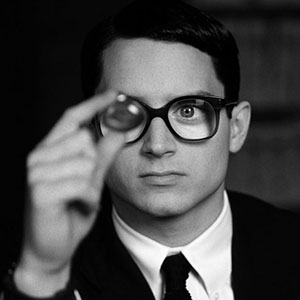
Jonathan Safran Foer
Jonathan, the protagonist in “Everything Is Illuminated,” is an odd, quiet young man whose large eyes (they are the eyes of Elijah Wood) are made larger by enormous spectacles. He wears a suit and tie at all times, even when he is sleeping outdoors in a field, and his hair is slicked nerdily. He compulsively saves mementos of everything, keeping them in Ziploc bags and tacking them up on the walls of his home.
It’s this desire to document his experiences in the world that leads him to the Ukraine, his grandfather’s homeland before fleeing the Nazis and coming to America. A woman named Augustine — all Jonathan has is a first name and a photograph — helped his grandfather make the escape, and Jonathan wants to find her and thank her.
To that end, he enlists the services of Heritage Tours, an Odessa-based business that specializes in helping American Jews find their dead ancestors. Our narrator, Alex (Eugene Hutz), is the 20-ish son of the proprietor. Alex dresses like an American hip-hop thug and apparently learned English from the wild-and-crazy Festrunk Brothers on “Saturday Night Live.” (“Many girls want to be carnal with me because I am such a premium dancer,” he says.) He is enlisted, with his grandfather (Boris Leskin) and their dog Sammy Davis Jr. Jr. (yes, Jr. Jr.), to drive Jonathan around the countryside in search of this Augustine woman.
That’s the setup for this contemplative, bittersweet film, as much a sublime comedy as it is a drama about the urgency of understanding and learning from one’s past. Based on the novel by Jonathan Safran Foer, it was adapted and directed by the actor Liev Schreiber, who makes an impressive debut in both capacities.
There is much to admire in the film’s strange sense of humor, from Alex’s bizarrely broken English, to Grandfather’s insistence that he is blind despite all evidence to the contrary (he’s the one who drives the Heritage Tours vehicle), to the quaint, fractured little Ukrainian places the travelers visit. But the purpose of the mission is serious, and it reveals things about the Ukraine’s involvement in the Holocaust that even Alex, who is as Ukrainian as they come, didn’t know.
Eugene Hutz is the lead singer in a “gypsy punk” band with no prior acting experience — but you wouldn’t guess it from his performance, which is jaunty and effervescent and utterly lacking in self-consciousness.
Elijah Wood, meanwhile, is earnestly calm as Jonathan, his face registering interest in what’s going on. It’s an effective method as it fits the film’s generally low-key demeanor. Wood has a magnetism throughout the film: Jonathan is such a fish out of water that watching him trace his roots is perpetually interesting. Watching Alex is interesting, too, but for the opposite reason — he’s free-wheeling and off-center. Together, they comprise a pair (and a movie) that is absolutely premium.
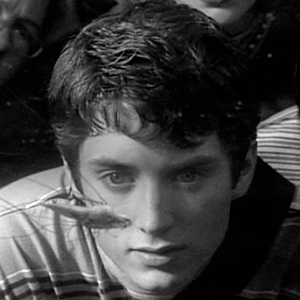
Casey Conner
One of these days, somebody’s going to build a full-fledged drive-in theatre here in town for the express purpose of showing Robert Rodriguez’s films. Think of it: lawn chairs in the back of your 4×4, a six-pack of Shiner Bock, and Rodriguez’s movies non-stop from dusk ’til dawn.
Until that happens, though, we’re just going to have to make do with catching the local auteur’s work at the multiplex. Co-written by Scream scribe Kevin Williamson and George Huang (Swimming With Sharks), The Faculty is pure Rodriguez, jam-packed with action, suspense, humor, horror, and plenty of cinematic homages. While it may suffer a bit from excess character clutter (nearly 10 major characters throughout), it’s nonetheless a slam-bang, sci-fi actioner, relentlessly paced and edited, with a pounding soundtrack and some ingenious aliens courtesy of Berni Wrightson and KNB Effects.
Elijah Wood plays Casey, the introverted class misfit at Ohio’s Herrington High School. When he chances upon a bizarre, slug-like life form while shooting pictures on the football field one day, Casey unwittingly uncovers a plot by aliens to infect the school’s faculty and, eventually, the whole planet. This sly spin on the high school caste system (think The Breakfast Club by way of Invasion of the Body Snatchers) is pure Williamson; the script is rife with knowing dialogue and genre in-jokes, and it’s a hoot to play “spot the allusion.” John Carpenter’s The Thing is hilariously echoed in a scene in which Casey and his classmates, Zeke (Josh Hartnett), Stokely (Clea DuVall), Mary Beth (Laura Harris), Delilah (Jordana Brewster), and Stan (Shawn Hatosy) must prove their humanity by snorting vials of diuretic No-Doz, while lesser genre highlights such as Night of the Kreeps are given their due as well.
Rodriguez’s film takes off like a rocket and never lets up from the get-go. The deadly faculty itself — football coach Willis (Robert Patrick), Principal Drake (Bebe Neuwirth), English teacher Miss Burke (Famke Janssen), science teacher Mr. Furlong (Jon Stewart), Nurse Harper (Salma Hayek), and Piper Laurie’s Miss Olsen — are a wonderfully creepy crew, morphing into slimy, Lovecraftian horrors and sprouting multi-tendrilled shadows at every turn. If anything, Rodriguez packs too much of a good thing into an already crowded film. Just as one hair-raising horror dies down, two more take its place. It’s a rush, yes, but sometimes I caught myself wishing for a breather of sorts. Still, no one around these days edits with such sublime accuracy as Rodriguez.
A master of the smash-cut, The Faculty is overflowing with the director’s “I’ll try anything once” spirit, and that’s what makes the film such witty, freaky fun. Besides, any film that can make the high school experience even worse than I remember it is aces in my book.
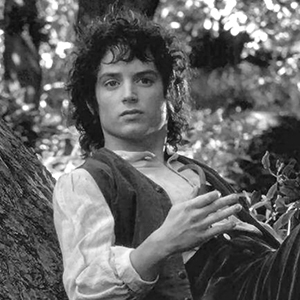
Frodo Baggins
I cannot stress this strongly enough: do not see this movie. If you do, it will ruin you for everything else. Films you’ve seen before, films you’re waiting to see, films you have on DVD… it doesn’t matter. All will pale by comparison after you finally lay eyes on Peter Jackson’s visionary masterpiece.
It feels like my eyes have been seared by three hours worth of raw imagination somehow burned into the emulsion by the sheer force of Peter Jackson’s will, like there are images etched there now that I cannot shake, that I do not want to shake. I close my eyes and I see a rush of moments, little details that pulled me into Middle-Earth with an intensity of belief I haven’t felt since I was seven years old. I have called friends up out of the blue, emotional today, dying to tell them about the movie. I am spilling over, drunk and delirious because my faith has been restored. FELLOWSHIP OF THE RING isn’t just as good as you’ve heard; it’s not just as good as the hype says; it’s not just a brilliant movie.
With utter confidence, I can say that FELLOWSHIP OF THE RING is one of the ten finest motion pictures it has ever been my pleasure to see.
I can’t hype you up too much for FELLOWSHIP. It’s that good. It’s dense with detail, richly imagined, beautifully performed. The casting is exquisite, down to the smallest role in the film. The design of the thing is breathtaking. I found myself lost in the corners of the screen this morning, marveling at the depth of Middle-Earth. This isn’t some set, some backlot invention. This is a place, a real point in time and space that Peter Jackson has somehow managed to invade with his cameras and his actors. Actually, even that’s not true, since these don’t feel like actors. The faces may be familiar, but that’s Gandalf the Grey. That’s Frodo Baggins. That’s certainly Samwise Gamgee. Who else could they be? I spent three hours with them, and I certainly believe they are who they claim to be. And those locations… I didn’t realize half of those towers and castles were actually standing in New Zealand. Hell, I didn’t realize the Shire was real. But I saw the evidence of these things with my own two eyes today. Rivendell… Lothlorien… the Mines of Moria… these are remarkably preserved, all things considered. I’m fascinated to learn more about the animal wrangler that had to handle the Ringwraith’s horses, the Cave Troll, and the Balrog. Must’ve been a tough gig. Still, getting to visit such amazing places in the flesh is an adventure I envy each of the cast and crew, whether they’re indigenous like Gimli and Legolas and the Hobbits, or just visiting like Boromir and Aragorn and Isildur.
This is a story that is about not just one race, but all races, setting aside their differences in order to stop evil in whatever form it takes. There is something truly doomed about the elves and the hobbits and the dwarves, and it took me until the middle of the movie to figure it out. Middle-Earth is not some other planet. Middle-Earth is not meant to be fantasy. In the work that Tolkien wrote and the film that Jackson made, Middle-Earth is a point in the real past of our world. Middle-Earth existed. These things we’re watching are not fables meant to teach some simple moral lesson. These are the events that led to the rise of man in the world. These are the days in which all these amazing creatures and beings gave themselves so that we might pick up the pieces and continue on.
Jackson and his co-writers Philippa Boyens and Fran Walsh have done a remarkable job of boiling this all down and laying it out. Things are repeated. Peter gently prods at just the right moments, connecting things, underlining the significance without drawing attention to his own directorial hand. By the time the prologue ends, I believed completely in the world and in the story. I was ready for anything.
And when we find Frodo Baggins (Elijah Wood) leaned up against a tree, reading a book, not a care in the world, it is enough to take my breath away. Here is the last second of real quiet before the storm, the last moment of innocence. This is when everything begins. This is that first step out the door that Bilbo spoke of. And it all starts with a hobbit reading and the sound of a wizard singing on the afternoon wind.
I love the scenes of Bilbo at his birthday party, telling the story to a group of adorable hobbit children. Holm is remarkable in his brief time onscreen, as is most of the sprawling cast. Peter Jackson seems to apply actors to roles the way Van Gogh applied paint to a canvass; there’s a sort of madness to it when first viewed, but there’s a perfection that is revealed upon closer scrutiny. The birthday party is a wonderful set piece to open the film with. Jackson finds grace notes in almost every shot of the film, always giving us some revealing detail, some perfect touch, some reason to keep watching. When Gandalf and Bilbo come face to face after the party in Bag End, it’s our first hint at how emotionally powerful the film is going to be. Visual power is well-established by this point, but during this scene, there is such remarkable work by both actors that all thoughts of effects and editing and makeup and such disappear. Suspension of disbelief is something that you are sometimes required to work harder at, depending on the film. Here, there’s no choice. These actors believe it completely, and they draw you into the world. Bilbo is corrupted by the Ring, but on a subtle, personal level. Only when he tries to leave it behind does the Ring’s grip finally reveal itself.
And Jackson has made The Ring a character, no doubt about it. The Ring has a will of its own. It has a hunger. It grows and shrinks depending on whose finger it wants to fit. It can find its way onto a finger at just the right moment. There is a sense of malice to its behavior over the course of the film. It is constantly trying to escape Frodo after he accepts the quest to destroy it. It tempts everyone it comes in contact with. It has a voice, a whispered hiss, the sound of seduction.
Frodo’s relationship with The Ring is played out with an almost eerie grace by Elijah Wood, who steps up as one of the finest actors of his age working today with this film. As good as he’s been in the past, the work he does here is transforming. He is an astonishing avatar for us, the viewer, a hero worth following. Much of the film is defined in the way he interacts with the rest of the cast, and it’s the support they offer to Wood that makes each of them great in their own way.
Shall we talk of McKellen? He is a marvel, the very model of a great film actor. McKellen has done wonderful work on film before, but in this particular role, he comes to full and vivid life in a way I’ve never seen. He conveys the full range of emotion in the smallest of gestures with those incredible, expressive eyes of his. He uses his smile to precise effect at several points in the film. Gandalf’s love of the hobbits is very strong in the film, demonstrated in any number of gestures and looks, and when he stands up against a threat, whether it be from Saruman, a cave troll, a wave of goblins, or a Balrog, he is imposing, a genuine power.
What of Viggo Mortensen? How is his performance as Aragorn, also known as Strider? At first glance, he seems to be playing the familiar scoundrel/warrior archetype we’ve seen before. But Mortensen, an actor I’ve been hypnotized by is determined not to play what we expect, and as a result, Aragorn is no film hero I’ve seen. He has a heart open enough to confess his love for Arwen, a sword arm powerful enough to face down five Ringwraiths or a small army of Uruk-Hai by himself, and a sense of duty strong enough to resist the siren call of the Ring when sorely tempted.
Sean Bean, on the other hand, is a revelation here because of the brilliant way he captures the conflict that rages inside Boromir. No easy bad guy, Boromir is a good man who stumbles. He believes in the glory of Gondor, and his description of it is one of the film’s best quiet moments. His redemption at the end of the film leads to one of the most wrenching film deaths I’ve seen in quite a while. Each arrow that is shot into Boromir, I felt deeply. The sound design during this scene is one of those little details that makes me giddy about Peter Jackson.
Then there’s Sean Astin, Orlando Bloom, John Rhys-Davies, Billy Boyd, Dominic Monaghan, Cate Blanchett, Liv Tyler, and Hugo Weaving. Literally all of the major speaking cast does wonderful work at some point in the film. Astin’s Sam is a faithful and courageous fellow, played to perfection by an actor I feel is highly underrated. I hope people finally start to appreciate how generous a performer he seems to be. Bloom and Rhys-Davies are appropriately badass, stalwart representatives of their respective races. Boyd and Monaghan are not just comic relief as Pippin and Merry; far from it. They are drawn into events in a comical way, but when things become serious, they reveal hearts every bit as stout as those of Frodo and Sam. Merry in particular has an ability to focus, to really make a difference. Blanchett’s Galadriel is quite wondrous, and her moment of temptation when facing the One Ring is both rapturously beautiful and very upsetting. Liv Tyler speaks in sheer music as Arwen, her lilting Elvish dialogue being one of the most direct sensory pleasures of the film. Hugo Weaving is precise and hypnotic as Elrond, and when we see him in the opening sequence fighting Sauron or in a flashback as he tries to convince Isildur to destroy the One Ring while they have a chance at the lip of Mount Doom, he is impossible to look away from.
I could go on and on, and I might. I have to see this film again and just pick up where I left off, praising that which has just begun to sink in. But right now, after this first viewing, I have a feeling that I’ve only had a few times in my life. I have found that elusive first high all over again, and I am positively sodden with the possibility of film. If I could embrace Peter Jackson tonight to say thank you, and if I could shake his hand, I would. I would commend him on having become a world-class filmmaker, a giant. Then I would jump him, wrestle him to the ground, and eat his brain in an effort to absorb his knowledge. This guy has just upped the stakes for everyone else.
I am impatient now, worse than every before. I want THE TWO TOWERS. I need RETURN OF THE KING. I want to take every step of the journey with Frodo and Sam and Gandalf and Aragorn and Pippin and Merry and all the others. I want to meet Wormtongue and Treebeard and Shelob and more.
And in the meantime, I vow to quit settling. I have decided that I am done forgiving. I have seen that it can be done, that real perfection is possible in film, and I am not willing to settle anymore. Peter Jackson, you magnificent bastard, you have broken my heart and given me more hope than you can possibly understand all in one fell swoop. I am in love with your movie.
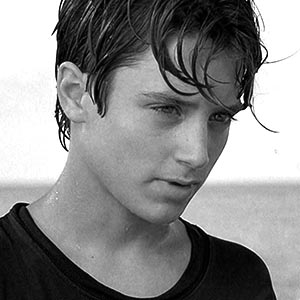
Sandy Ricks
“Flipper” is sunny, amusing big-screen entertainment — the kind that nets major millions at the box office — but there’s not much new under the Caribbean sun in this ’90s update of the popular ’60s television series and films.
“Flipper” features a winning cast: Paul Hogan as a crusty bachelor on a Bahamas island and Elijah Wood as a teenager made sullen by having to spend a summer in the middle of nowhere when he could be home hanging with friends and checking out rock concerts. Three live bottlenose dolphins starred in the title role, along with an animatronic critter. The dolphins are charming, which is at least 50 percent of the concept of the film.
Hogan plays a cigar-chomping former Beach Boys roadie named Porter, who is living the hippie life in paradise. He’s got a large, ramshackle beachfront house, a fishing boat that provides his livelihood and a grubby but smug bachelor lifestyle in which he answers to nobody. He even has a smart, spirited girlfriend, Cathy (Chelsea Field), who wants to marry him. More important (at least for the plot) is Cathy’s vocation: She’s a marine biologist.
To the grumpy kid, Sandy (Wood), Uncle Porter is a dinosaur and a wise guy. Pushing here, berating there, he makes his nephew feel uptight. And in terms of teenage thrills, the island is dead.
Flipper, orphaned by greedy local sportfishing interests who kill dolphins because they interfere with commerce, changes all that. In their first meeting — during a fishing trip — Sandy protects Flipper from gun-toting party-boat captain Dirk Moran (Jonathan Banks), the film’s ruthless villain.
Sandy and Flipper immediately establish a rapport, and Flipper delights the kid by following him to a lagoon and performing tricks for him — the dolphin leaps out of the water at Sandy’s command. When other kids are attracted to Flipper, including a teenage girl named Kim (Jessica Wesson), things begin to look up for Sandy.
As the plot thickens, it turns out Moran has been doing nasty environmental things offshore. The sheriff (Isaac Hayes) wants physical evidence before he’ll take any action, and that gives Sandy, his uncle and their respective female friends a challenge. Within this context, “Flipper” has just the right amount of environmentalist subtext and doesn’t get preachy. This handsomely photographed movie also captures the appealing, laid-back island lifestyle and offers mesmerizing underwater scenes worthy of a National Geographic special. Especially effective are sequences showing dolphins dealing with a huge, hungry hammerhead shark named Scar.
“Flipper” is tame enough for all ages, though small children may find it too long and too talky.
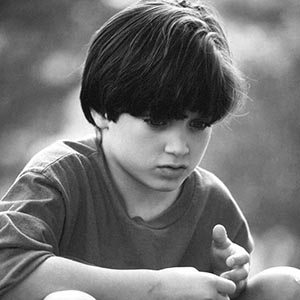
Nat Cooper
Forever Young is yet another reincarnation of the Rip Van Winkle theme, of which we have recently had several examples of the cryogenic type: Encino Man, Late For Dinner, to name two. Hackneyed as the concept is, Forever Young manages to be fresh and interesting because of the interesting performances by Mel Gibson and the other members of the cast. Unfortunately, the director and writer made a couple of egregious mistakes in visualizing how a sleeper adapts to a changed world and how a person ages.
This is probably the romantic story that a lot of Gibson’s fans have been waiting for. His acting is easy and natural, more impressive than the somewhat forced “I am an actor” approach to last year’s Hamlet. The special charm he brings is the antiquated courtliness of a man from a half-century ago. His shock when he hears a respectable, single mother curse and casually discuss her lovers speaks volumes to establish his character and his fish-out-of-water situation. He is simply perfect in the part of the resuscitated test pilot searching for his past “across oceans of time,” to borrow a phrase from another movie that might stand as the dark side of this one.
Gibson is supported by a first-rate cast. Elijah Wood is the fatherless boy who finds Gibson and wants to keep him with a desperation that is nearly palpable. Jamie Lee Curtis plays the mother who befriends this strange stranger and who would like to be more than just friends. Gibson’s friend who originally puts him on hold is played by George Wendt; it is somewhat disappointing that we don’t see more of Wendt than we do. Isabel Glasser is Gibson’s love in the 1939 sequence in an promising debut.
And, yes, Mel Gibson shares his well-regarded butt with us for a brief shot, tastefully half-lit. Brief, but memorable.
There are inconsistency problems when Gibson wakes up to 1992. Push-button phones don’t throw him, but answering machines do. There is the fact that, numerous Dracula movies notwithstanding, if a person were to suddenly age, his or her hair would not turn gray from the tips back to root, nor would it happen faster than hair can grow. Likewise, with the rest of geriatric makeup, it’s well done — Oscar material, really — but wholly impossible. In a Dracula movie, this is not a problem. In a romantic film, much more grounded in our quotidian world, it is a problem. And leave us disregard out of charity the whole issue of Gibson’s freezing and resuscitation — fun scenes, but slightly insulting to anyone prepared to give it a minute’s thought.
Forever Young, on the other hand, could very well attract a large following. It is, despite playing fast and loose with laws of thermodynamics inter alia, an excellent entertainment: a romantic fantasy, just torrid enough to melt even this reviewer.
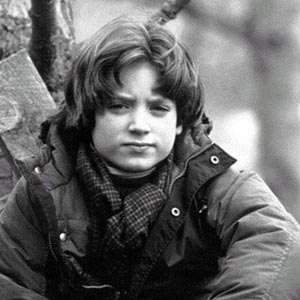
Mark Evans
Our culture insists on the innocence of children. Even the exceptions are proof: ”The Omen”’s Damien couldn’t be just a brat, he had to be Satan. But we know better, and so does The Good Son, a nasty and rich pop thriller that looks at a child and sees the numb blandness of a future serial killer. Directed by Joseph Ruben with the craft that made his 1987 film ”The Stepfather” a B classic, ”The Good Son” is ”Strangers on a Train” in knee pants.
The key to the movie’s power is that it stars a young actor with the talent to take us across emotionally raw terrain — but that actor isn’t Macaulay Culkin. Don’t get me wrong: Mac is fine and spooky here, but his performance stays well within the opaque limits staked out by the ”Home Alone” movies. It’s Elijah Wood, ”The Good Son”’s real star, who grabs our sympathy. As Mark Evans, sent to stay with his aunt and uncle in Maine after his mother dies, Wood balances fierce smarts and wounded sensitivity. At first, Mark holds his own with creepy cousin Henry (Culkin); they break windows, tease Henry’s kid sister — standard kid stuff. But Mark quickly sees that Henry’s cruelty is cold, logical, and unfathomably deep.
”The Good Son” delivers its knuckle-gnawing set pieces with a skill that makes other thrillers look logy. When Henry pushes his ice-skating sister onto the thin part of the pond, for example, the movie daringly stops in its tracks to listen to the ice bellow before giving way. But Ruben and his screenwriter, Ian McEwan, are most daring when they tap into something we rarely admit about childhood: Where most kids learn to temper any innate sadism with ethics, some just don’t. There are people who will despise the movie for that. Intentionally or not, it forces unpleasant connections — to what we know about Jeffrey Dahmer’s youth, for instance, or to increasingly frequent news photos of of blank-faced teen killers. They’ll despise it, too, because the movie presents its dark vision so well.
Make no mistake: There is artistry here, not least in the film’s resonant emotional undertones. In his grief, Mark becomes convinced that the spirit of his dead mom has entered his aunt Susan (Wendy Crewson), and ”The Good Son” develops into a tussle between him and Henry over Who Gets Mom. Anybody with siblings will relate, but Ruben ups the Freudian ante in the staggering climax by putting Aunt Susan in a position where she has to choose. She does so, and in a way that will hang in your mind for a long, long time.
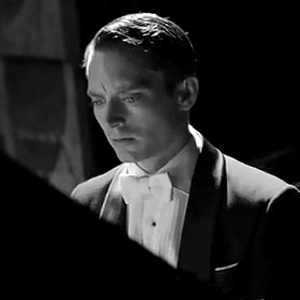
Tom Selznick
A welcome reminder that high-concept thrillers needn’t rely on stupid coincidences and even stupider characters in order to succeed, Grand Piano turns the unlikeliest of scenarios into a riveting battle of wills. The story of a concert pianist whose comeback performance gets hijacked by a sniper with a secret agenda, director Eugenio Mira’s latest film breathlessly combines artistic anxiety and personal desperation, providing its character with a journey as intense emotionally as it is physically. In fact, probably the best Brian De Palma movie he never made, Grand Piano expands the boundaries of single-location, real-time mysteries like Phone Booth and Panic Room with a brilliantly simple concept and nimble, elegant style.
Elijah Wood plays Tom Selznick, a master-class pianist set to play in public for the first time in five years. Having famously choked during a performance of a piece by his late mentor, he is understandably nervous about his return to the stage. But shortly after he begins playing, he discovers that someone has marked up his sheet music with threats to murder him and his wife Emma (Kerry Bishe) unless he performs flawlessly. Receiving an earpiece that allows his would-be puppetmaster (John Cusack) to communicate with him, he’s confronted with a challenge that has multiple repercussions, namely, in delivering a performance that not only saves his career, but his very life.
As loathe as I am to describe the music in the film as another character, the pieces selected by the filmmaker are absolutely essential, providing a (no pun intended) meticulously-orchestrated through line that frames and enhances each new development in the story even as it serves as a ubiquitous reminder of Selznick’s past failures. That it occasionally allows him to depart the stage mid-performance constitutes great planning on Mira’s part, but the fact that it provides a parallel line for Selznick’s emotional state as he embarks on this unexpected roller coaster is truly masterful. There are few modern examples of music being truly integrated into storytelling, certainly as well as this film does, and even without an appreciation for classical composition, there’s much to admire about its use and effectiveness.
As the man behind the keys, Wood carries the film, finding a believable and compelling arc for a character whose default setting might in lesser hands be desperation. Selznick’s paralyzing fears of choking a second time are echoed repeatedly in dialogue in opening scenes, first during a particularly contentious phone interview commemorating the performance, then from virtually everyone he encounters. he’s not allowed to forget how grandly he flopped five years prior, even if he could manage to forgive himself. But through Wood, the character convincingly evolves over the course of the film, initially aiming for perfection out of fear, and then slowly building his confidence as he begins to devise a way to turn the tables on his unseen adversary.
Wood is an ideal casting choice for a role like this handsome and obviously gifted, but overshadowed physically by the actress who plays his more-successful movie star wife and he turns an otherwise self-contained journey into an opportunity for personal empowerment and professional redemption. Meanwhile, Cusack has less to do physically as the voice on the other end of Selznick’s earpiece, but he nevertheless communicates a palpable sense of danger that his victim is right to take seriously. Together, they create a psychological duel worthy of the film’s theatrical pitch, cementing its intensity as the final, crucial notes of Selznick’s performance rapidly approach.
Serving as more than a welcome contrast to the handheld, improvisational camerawork of too many other movies these days, Mira’s direction is a marvel of fluidity and poetry. The careful composition of each shot enhances the film’s melodramatic sweep without distracting from the story and performances; whether simply taking inspiration or outright stealing pages from (classic) De Palma’s playbook, Mira distinguishes his film with a classical, muscular visual style that suits its high-society backdrop, and mirrors Selznick’s mental scramble to focus on his performance and his potential murder at the same time.
Although he’s occasionally distracted by expository or plot-lengthening devices such as the sniper’s accomplice and his wife’s obnoxiously self-involved friend, Mira makes a breakthrough here as a storyteller and visual stylist that should pay great dividends, regardless of whether or not he chooses to migrate from Spain to Hollywood. But regardless of his own future, Mira makes Selznick’s comeback a remarkably immediate experience by dropping the audience into the middle of his implausible, heightened concept and then enabling them to identify with the character’s anguish. Ultimately an expertly timed, painstakingly assembled and endlessly engaging game of cat and mouse, Grand Piano succeeds as a whole for the same reasons that Selznick does, namely, because Mira brings all of its elements to work together in concert, and then executes them like a virtuoso.
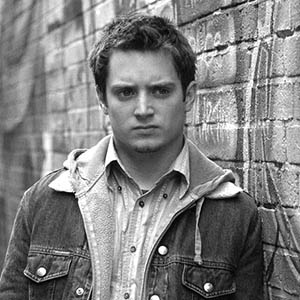
Matt Buckner
SCREENED AT THE 2005 SXSW FILM FESTIVAL: Not long ago I saw a pretty solid Brit flick entitled “The Football Factory.” It’s a look into the world of UK football hooliganism, and while I found the subject matter pretty damn fascinating, I felt the movie lacked that personal edge that separates great films from the pretty good ones. Fortunately there’s another new film that broaches the same subject – one that brings some real humanity to such anarchic subject material. “Hooligans” recently won several awards at the 2005 SXSW Film Festival, and I’ve no trouble understanding why.
Raised in the lovely American town of Philadelphia, Pennsylvania, I was taught that OUR sports fans were among the most vocal, the most passionate, and (occasionally) the most ornery sports fans in the country. Well, that may be true, but after seeing what goes on in Lexi Alexander’s smoothly entertaining Hooligans – I’m beginning to think that even the most hardcore American sports fans have nothing on our friends across the pond. The UK football fans can reach levels of physical insanity generally unseen outside of riots, fires or earthquakes.
I suppose it’s the inherent passion for the local team, combined with each small town’s close proximity to one another, that allows UK football hooliganism to thrive. But thrive it does, and woe is the non-brawler who happens to show up at the wrong football match on the wrong afternoon. Stripped down to its barest essence, ‘hooliganism’ is what happens when fans of Team A meet up with fans of Team B…and then beat the absolute crap out of each other in the streets. Clearly this is an activity for the angry young men, but it tends to plaster a few black eyes onto entire communities every weekend.
Devotion and passion for one’s hometown team is, indeed, an entertaining and admirable thing to see, but these young football fans take it to a degree that’s just horrifying.
Young Matt Buckner is about to graduate from Harvard when he chooses to take a fall for his roommate. Summarily expelled for a nasty drug habit that’s not even his, Matt hightails it over to England, where he hopes to spend some quiet decompression time with his big sister. It only takes about 45 seconds before Matt is knee-deep in the “hooligan culture,” as he strikes up a quick friendship with a charming ruffian called Pete.
Pete’s mates don’t take to the Yank right away, but Matt proves his mettle during an alleyway brawl, and boom – he’s one of the gang. Matt is so quietly thrilled with his loyal new pals that he ignores the basic common sense that says “Hey, bare-knuckled alleyway brawls are not exactly conducive to a healthy lifestyle.” But the comradeship and constant adrenalin rush work as their own narcotic, and Matt’s more than happy to join in the fray.
And then things turn really ugly…
So while I was enjoying the heck out of Hooligans, I found myself wondering what made this flick a marked improvement over The Football Factory. And one of the answers I came up with was: Elijah Wood and Charlie Hunnam.
If you’re looking for an actor to capture youthful idealism mixed with tentative insecurity, then Elijah Wood should be atop your list. This actor’s got real chops, and he absolutely deserves to be seen as more than just Hobbit-like. He’s the heart, the soul, and the anchor of Hooligans and Wood just nails his role in scene after scene.
And even better than Wood’s performance is that of Charlie Hunnam as Pete; at first glance his character seems like little more than an irredeemable thug, a posturing tough guy who lives to humiliate and belittle. But as Hooligans goes on, you’ll find yourself absolutely hypnotized by Hunnam’s performance. He’s equal parts ignorant, loyal, scary, charming, confused and fragile. Perhaps best known from his excellent work in the criminally underrated Nicholas Nickleby adaptation from a few years back, this Charlie Hunnam kid is absolutely poised to become a huge star. And soon.
There’s great support work all around; Claire Forlani (a British actress playing an American living in Great Britain) delivers some of her best work in years; her husband is played by Marc Warren, and this is another new face who absolutely owns the screen. In only a few scenes Warren is able to make you care deeply for his (admittedly flawed) character, and this helps to make the peripheral subplots just as compelling as are the non-stop fisticuffs.
One of Hooligans best perspectives comes in relation to the numerous fight scenes. First-time director Lexi Alexander takes great pains to make sure that the brawls are cinematically exciting – while never allowing the mayhem to seem too flashy or appealing. That’s a really tough balance to strike, and to the director’s credit, you certainly won’t walk out of Hooligans trolling the alleys, itchin’ for a fight.
I’m not exactly sure how well “Hooligans” will succeed here in the States, as we’re generally not all that interested in sports stories that aren’t A) our own, or B) littered with ponderous cliché. But the movie works resoundingly well as a spotlight onto another country’s sports-obsessed culture, plus it’s just a damn well-made piece of storytelling, period.

Mumble
This is not “just an animated movie.” HAPPY FEET is epic, enlightening and entertaining with production values to rival that of “Star Wars.” Written by actor-turned-scribe Warren Coleman, veteran screenwriters John Collee and Judy Morris (who gave us “Babe: Pig in the City”), and director George Miller, this is a vibrant beautiful blend of joy, heroism and celebration iced with some palatable eco-socio-political commentary. But above all, this is a story about, love, friendship, individuality, acceptance and that dare to be different and boldly go where no penguin has gone before. Designed and directed to kids but addressing issues confronting adults, the story and its subplots play out as the sum of the parts, not individual parts. Cohesive and well thought, nothing is fragmented. Daring in its voice and message, the result is a universally appealing tale. Each character is well crafted with impeccable attention to personality traits. And of course, this is only enhanced by the voicing from some rather talented stars.
Elijah Wood assumes the role of Mumble, the only penguine who can’t sing, but boy, can he dance! With a bold shyness, Wood is solid with his spin on Mumble. Nicole Kidman, on the other hand, adds a softness and soothing lull to Norma Jean, Mumble’s mother. With never a waver in affection for her child who is different, you can hear a mother’s love and pride in her voice. Fellow Aussie Hugh Jackman who is Hollywood’s Man of the Moment thanks to “Flushed Away” and “The Fountain” gives voice of Memphis. And that brings us to Robin Williams. Taking on the daunting task of voicing three characters, Williams is a blast. Be it as super-cool, super-star, super-suave Ramon which reminds me of Bruno on “Dancing With the Stars” or the sultry hippie-esque Lovelace or buffoonish Cletus, he will have you in stitches and laughing so hard your own feet will tapping the theater floor as you anxiously wait to run to the restroom for laughter relief. Clearly, the comedic hilarity was reserved for Robin.
And with a touch that will bring tears to your eyes, the late Steve Irwin, the Crocodile Hunter himself, voices an elephant seal that Mumble meets in his journey. More apt dialogue there could not be, as true to Irwin and his passion, in one sequence the elephant seal warns Mumble of future dangers with the “annihilator aliens.”
But the real star of this film is Savion Glover. Dancer extraordinaire, he provides the moves for those tiny tappin’ Happy Feet. Rigged up to motion sensors, Glover’s dancing moves were captured on computer via motion-capture and then compliments of state of the art CGI, transferred to Mumble. But let’s go one step further, add another 50 or so dancers all performing Glover’s moves in sync. Let’s capture all of them on computer. And then, let’s go even further and through the magic of the movies, transfer the moves to 20,000 penguins dancing on ice in Antarctica! Talk about happy feet!!!! The effect is mind-boggling, sheer, pure, unadulterated JOY! And this is the most advanced and intricate use of motion-capture photography in a film to date.
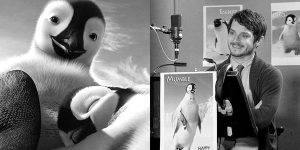
Mumble
When was the last time you watched The Lion King? If it was when you were twelve or under, go back and watch it again; it was such a good movie then, It’llbe just as good now. They made the movie so that parents wouldn’t be sick of watching it with their kids dozens of times. Some movies can span generational gaps and are funny regardless of your age. Happy Feet 2 is one of these films. When I showed up to watch it, I was alone in a room full of young families, so truth be told I was a bit skeptical I’d have fun, but almost immediately from the outset it made me smile.
Happy Feet 2 starts off a couple years after Happy Feet left off. Mumble and Gloria are now married and have a kid, Erik who is awkward. The film opens with one of the famous penguin sing-and-dance ensembles, which sets the tone for the rest of the movie. We’re shown that there’s a rouge iceberg on approach to penguin-land, which adds some tension. And it is at that moment where Mumble’s kid runs off to find himself a new home since he’s too awkward. And thus does the story begin. I won’t give any spoilers because this is something you have to see.
What I will say though, is that this film is masterfully done. There are a series of subplots which are intertwining, one of which involves two incredibly likeable characters, Will and Bill, the krill, who decide that they want to swim against the swarm. What Miller, producer, writer and director of Happy Feet, has done is he has imbued each creature with a sense of humour and personality of their own. It’s probably the krill that stood out the best for me, as they have plenty of witty lines which are plays on words that the adults will get and the kids won’t. This is why I mentioned Lion King at the outset, it is one of those films where there are two different, mean humors for the audiences, and whereas most movies attempt to lump these means together into one, humour distribution, Happy Feet 2 is able to create a mixture-of-humours model, utilizing two different humour distributions for optimality.
Another tool that Miller uses to bring life into the Antarctic is by utilizing 3D. The characters become that much more real in the landscape when they pop out of the screen. The shots are even well framed for 3D, as it is not uncommon to be blown away by the expanse of the sky when the shot is just of a couple penguins/elephant seals/etc. There is also one shot in particular which sticks out, where the krill decide they want to become carnivores. They attack a sea lion. The camera pans across down the length of the body, and the viewer really does get a sense of scale of the animal, as seen from the krill’s perspective. The last point I want to bring up is the music. Somehow, they were able to take a slew of contemporary pop songs, blend them together, and harmonize it across hundreds of animals. As much as I hate musicals, I had a ton of fun, and I have no doubt that this will be a classic.
So in essence, go see this movie. Even though it’s a kids’ movie, you’ll still have an awesome time.
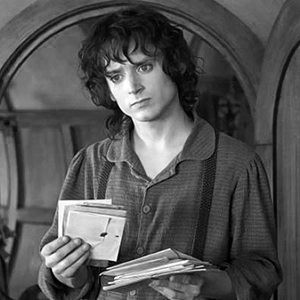
Frodo Baggins
The mighty Dwarvish stronghold at the base of the Misty Mountain has been invaded by the vicious and unforgiving Dragon Smaug, driving the Dwarves from their ancestral home. When a band of Dwarves led by Prince Thorin (Richard Armitage) begin a quest to vanquish the fire breathing menace from its occupation they enlist the help of Gandalf the Grey (Sir Ian McKellan) and a Hobbit (Martin Freeman).
Filmmaker Peter Jackson’s epic visual brush strokes are back and New Zealand’s sublime natural beauty is once again on show. Seeing the sun drenched rolling hills of Hobbiton is like a cinematic opiate. This is an expansive exploratory effort with the bounds of the aesthetic he forged in the last trilogy. Despite the fantastical elements, Jackson anchors the cast to the emotional core of the work and once again extracts very good performances. There’s an early highlight in how Jackson seamlessly transforms Tolkien’s written tunes into a sombre ballad, loaded with the struggle that’s to follow.
The Hobbit is deceptively named. Instead of three films that are unnecessarily stretching the notably small novel, screenwriters Peter Jackson, Phillipa Boyens, Fran Walsh and Guillermo Del Toro have used Tolkien’s vast repositories of ancillary stories that flesh out Middle Earth’s history prior to Fellowship and stitched them into the world’s most iconic literary prequel. As we inhabit Bilbo’s outsider perspective, there’s a notable detachment from his Dwarvish companions. This is in stark contrast to The Fellowship of the Ring’s, well fellowship. The core hobbits (Frodo [Elijah Wood], Sam [Sean Astin], Merry and Pippin) under the fond gaze of Gandalf, and fierce protection of Aragorn (Vigo Mortenson) have a flourishing relationship and we get to know the characters deeply. In HAUJ the sheltered, diminutive quest group is in awe of the towering world around them. The beauty of Rivendell, the quaint quiet of Hobbiton, and the storm giants hurling hill sized boulders at each other it’s only once they enter the labyrinthine cave systems the characters growth in stature and personality. While there are some momentary lapses into the laborious where the story feels as if it’s laying the foundations of the two following films; the running time all but flies by.
McKellan effortlessly cloaks himself in Gandalf the Grey once again; he’s got the gravitas to elevate the material and to set a performance standard for those new to the franchise. Martin Freeman’s Bilbo is a much more stubborn loner and generally subdued hobbit than his nephew. He’s struggling to understand his role in this quest, and he gives enough of a nod toward his future self that you feel the character’s in great hands. And the visually luscious offering that will leave you speechless is the meeting between Bilbo (Freeman) and Gollum (motion captured performance by Andy Serkis). Witnessing technological leaps even in the last decade during their “game of riddles” is a highlight of the film. Serkis’ performance is unbelievably vivid. The WETA graphic artists create a disconcerting level of detail in every tick and miniscule facial gesture beats its own personal best set in the previous trilogy.
The Hobbit: An Unexpected Journey had me with the dulcet melancholy of displaced Dwarves, yearning to be home. It’s with an abiding love for the complete works of J.R.R Tolkien that Jackson (and his collaborators) assembles the disparate pieces of his legacy into the beginning of another grand arc. When asked why a Hobbit (Bilbo Baggins) Gandalf answers, “because he gives me courage.” I concur.
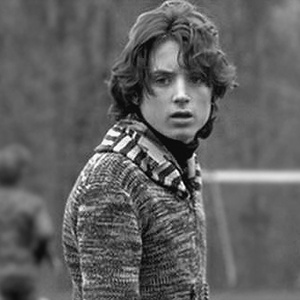
Mikey Carver
I really didn’t know what to expect from The Ice Storm. What I got was a quirky, strange, and somehow satisfying look into the self-destruction of two families in 1973 Connecticut.
The Hoods are coming apart as the result of Ben Hood’s (Kevin Kline) drinking and adultery. Elena Hood (Joan Allen) seeks solace in the simple adrenaline rushes that riding a bicycle and shoplifting can provide. Their daughter, Wendy (Christina Ricci), is becoming increasingly sexually active, no matter the possible consequences. Their son, Paul (Tobey Mcguire), who goes to a private high school, is scheming a way to get a date with a girl named Libbets Casey (Katie Holmes) before his best friend has sex with her.
The Carvers, who live next door to the Hoods, are also having trouble relating to one another. Jim Carver (Jamey Sheridan) is a detached father figure. When he returns from a trip, his oldest son, Mikey (Elijah Wood), asks, “You were gone?” Mikey is also detached, but is pursuing his sexual interests with Wendy Hood. Mikey’s younger brother, Sandy (Adam Hann-Byrd), idolizes Wendy and also likes to blow stuff up with M80’s. Janey Carver (Sigourney Weaver) seems to put up with all of it because she has to rationalize her affair with Ben Hood.
The film climaxes as a giant ice storm slowly freezes the neighborhood, trapping most of the major characters inside, forcing them to deal with the questions at hand and the results of their actions.
There’s an atmosphere of gloom that seems to wash over this film. Although the film takes place around Thanksgiving, there is no sense of a holiday or anyone giving thanks for anything. In fact, as Wendy says grace at the dinner table, she says, “Thanks for letting us white people kill all the Indians.” Everyone seems to be disgusted with what they have or, at least, unsatisfied.
But, yet, the movie is not depressing in the least. In fact, it’s quite funny in places. Some of the casual observations about the 1970’s are dead on. Having grown-up in the mid-1970’s, many scenes brought back vivid memories of my own childhood.
The performances are all finely crafted. Kevin Kline, Christina Ricci and Elijah Wood’s being the standouts. Sigourney Weaver’s character, however, doesn’t seem as defined as the rest. James Schamus’ screenplay contains some great dialogue and Ang Lee’s direction is subtle, but effective. Although the characters all seemed unhappy in their roles in life, I quite enjoyed my role as a witness to it all. Highly recommended.
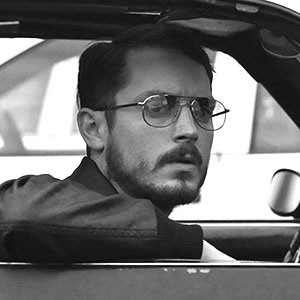
Tony
Let’s get right down to it: I Don’t Feel at Home in This World Anymore. is punk rock, effortlessly cool. It’s a movie where if you go in cold, no trailers or reading the synopsis, the chaotic ride is so much grander. It’s not secret I’m a huge fan of multi-hyphenate Macon Blair (star of Blue Ruin), but even if is name was not attached to this film, I’d still love it. It’s so fucking crazy cool.
I Don’t Feel at Home stars the lovely Melanie Lynskey (Hello I Must Be Going) as Ruth Kimke, who wants people to be nice to each other. She figured out how to be a human before most of the world. It’s a harsh world and being kind goes a long way. However, that’s not how the things work. When we first meet her, she’s aiding one of her patients at a hospital – she’s a nurse’s assistant – and the patient dies with her in the room. It’s a jarring moment, but there’s some light humor, as the patient’s last words for her family are, well, disgusting.
When Ruth gets home, she discovers her house has been broken into, and some of her most beloved possessions have been stolen. It’s safe to say she’s having one very bad day. Ruth does have some luck, in one of the strangest ways possible. She becomes friends with her eccentric weirdo neighbor Tony (Elijah Wood, who is super fucking hilarious as this character) by throwing his dog’s poop at him it left in her yard when he’s taking it on a walk. This interaction is where her courage to fight back begins. It’s a defining moment for her.
Shortly after, her phone dings to show the location where her stolen computer is now located. She has the correct What the fuck do I do now? expression painted on her face anyone would have in this strange situation. She enlists the help of Tony to get her belongings back, which puts them on an uncomfortable, funny, and inadvertent ultra-violent adventure of retribution. All Ruth wants is to get her stuff back, and for people to try to be good, or better, but if that won’t happen, give her her fucking stuff back.
Macon Blair first burst on the scene in Jeremy Saulnier’s excellent hyper-violent tale of revenge, Blue Ruin. If you haven’t seen this movie, stop what you’re doing now, get a copy, and watch it. I’ll wait. Done? Cool. You’re welcome.
Blair is just as talented behind the camera as he is in front. He’s no stranger to writing – he’s penned a script and graphic novel, but this is the first time he’s sitting in the director’s chair. His work behind the camera is staggeringly good. He knows exactly what he wants us to see and feel, and more importantly, he gets real, raw emotions in uncomfortable situations, and understands something about violence that most directors get wrong: it’s quick and shocking. (The reactions from a character seeing real violence for this first time is hilarious and bonkers. But it’s real. It’s how you and I would react.) Blair is a talented fella and can write and direct, that’s for damn sure.
As Ruth, Lynskey fills the character with real sympathy for people and wanting everyone to be good, but when she learns there are truly ugly people out there, she takes the role in a quite explosive and fascinating turn. That’s why Lynskey is such a wonderful actress. She’s unpredictable and her often quiet, nuanced performances never fail to amaze. She’s that good.
Almost stealing the show is Elijah Wood. His Tony has spent a lifetime collecting Chinese throwing stars (that do come in handy when thrown correctly) and other Japanese weapons, and masturbating to porn. He believes superheroes are real, and he can be one of them with said weapons with his go-get ’em attitude. He dresses like he still loves the 80s, has a rat tail and wears those big aviator glasses mob bosses wore in the 70s, and pedophiles took up in the 80s. As Tony, Wood is fucking hilarious and awesome. This character is so good; I wish there were a spinoff of him helping people solve problems, one neighbor at a time. I love, love, loooove this character. I’ve never liked watching Wood on screen more than I did in this movie. He’s that good.
If I had to classify I Don’t Feel at Home in This World Anymore., I’d call it a modern suburban noir. There’s enough sleaze, bad guys, violence, and mayhem to make it so. It’s one of the most fun movies I watched in a very long time, and I’m pumped for Blair’s future endeavors as a director.
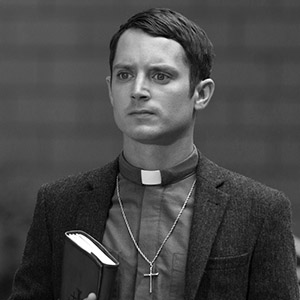
Dolan the 37th
Many films try and fail to pull off the kind of densely over-plotted action-fantasy that director Breck Eisner (“The Crazies,” “Sahara”) nails in “The Last Witch Hunter.” The secrets to Eisner’s success are confidence and patience, both of which compensate for the film’s script whenever it becomes embarrassingly thin (especially during its rushed finale). Still, if nothing else, “The Last Witch Hunter” is so much more adept than other recent convoluted post-“The Matrix” adventure films about a superhuman men-of-action (Vin Diesel, in this case) who see the world for what it really is, and are humanity’s last hope of maintaining a peaceful status quo. While most other films sprint through expository dialogue, and bluster their way through action scenes, “The Last Witch Hunter” is measured enough to make you want to suspend your disbelief.
An especially charming Diesel plays Kaulder, a witch-slayer who was cursed to live forever by the Witch Queen (Julie Engelbrecht) back in ye olde Viking days. An integral member of the mortal-led witch-hunting organization Axe and Cross, Kaulder has grown full of himself after centuries of walking the Earth unchallenged. But when Ellic (Michael Caine), Kaulder’s sidekick and the chronicler of his stories, dies on the day of his retirement, Kaulder investigates, and discovers a plot to revive the centuries-dead Witch Queen.
Here’s where “The Last Witch Hunter” starts to get so dorky that you may want to give yourself a wedgie for enjoying it. In order to stop the Witch Queen, Kaulder must “remember [his] death,” a clue left for him by Ellic in smudged fingerprints all over one of Ellic’s most prized books. The Rolodex of enemies and fair weather contacts that Kaulder meets up with on his rocky road to remembering is embarrassingly preposterous. Their ranks include Max Schlesinger (Isaach De Bankole), a blind pastry chef-cum-magician who makes cupcakes out of psychedelic moths, butterflies, and maggots, and Belilal (Olafur Darri Olafsson), a squat, curse-slinging warlock whose bushy beard and barrel chest makes him look like one of ZZ Top’s touring bassists.
What makes this scenario work are the periodic flashes of intelligence that prove that the film’s trio of screenwriters thought about what motivates Kaulder. Diesel’s usual cockiness suits his character. As he points out to Dolan the 37th (Elijah Wood), Ellic’s successor at Axe and Cross, there’s nothing he hasn’t seen. Diesel is well-used in that sense, proving he’s more than a blunt instrument in scenes where he huskily broods and sweet-talks his way around the film’s most unwieldy exposition. Few action stars can convincingly mansplain their way through a scene where mystic rune stones that control the elements are used to stop and start a thunderstorm. Diesel is on the short list.
There are even fewer directors who are sensitive enough to sell scenes as conceptually all-over-the-map as the ones showcased here. But thanks to Eisner, there are blessedly few scenes in “The Last Witch Hunter” that feel rushed (can we please get this guy to direct the upcoming “Doctor Strange” movie’s sequel?). Romantic banter feels genuinely playful in scenes like when Kaulder and Chloe (Rose Leslie), a young witch, flirt at Chloe’s hookah bar. There aren’t nearly enough scenes where Eisner can flex his muscles and prove that he’s a stronger storyteller than the script with which he’s working; the best is probably when Chloe comes home and silently tries to ward off a threatening spirit with an array of light bulbs. This scene teaches you how to watch it. No character has to explain that the bulbs’ light is Chloe’s only defense against whatever is threatening to invade her home. You just pick up that knowledge by watching Eisner work.
Eisner’s direction is similarly thoughtful during big special-effects-driven set pieces. He’s a sturdy choreographer, and none of the big action scenes in “The Last Witch Hunter” are as good as those from his surprisingly atmospheric, recent remake of George Romero’s “The Crazies.” But flashbacks to Diesel’s “Dungeons and Dragons”-worthy encounters with the Witch Queen and modern-day skirmishes with Belial do look good, and that’s not just because of Eisner’s keen eye for composition.
“The Last Witch Hunter” is just generally poised in ways that most fantasies should be, but aren’t. There’s breathing room in scenes where characters have to appear to be living with decisions they made a couple of scenes earlier. You know you’re seeing an atypically dopey but consummately well-assembled fantasy when poor Michael Caine has to explain to viewers the Witch Queen’s plan to spread a human-decimating plague using the various witches that Kaulder locked up over the years in the Axe and Cross’s “witch prison.” “The Last Witch Hunter” may be corny at heart, but it’s cool enough to convince you otherwise while its creators sell you a story you’ve seen some iteration of many, many times before.
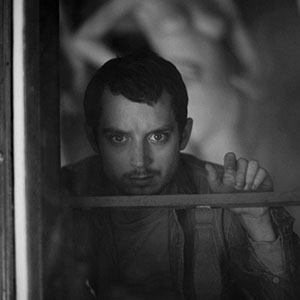
Frank Zito
Maniac is perfectly brutal, gritty, in-your-face horror with a film-noir bite, sporting a memorable performance by Elijah Wood that makes me wish horror films had their own Oscars-like event.
When I saw Fede Alvarez’s Evil Dead remake earlier this year, I couldn’t believe I was actually watching a horror remake. It was a breath of fresh air in an otherwise stale movement of churning out newer versions of old classics, with little success in the quality department of course. But I thought, surely this instance is a fluke, we couldn’t possibly have more than one good horror remake in the same year, right? Then Franck Khalfoun came along, sternly pimp-slapped me across the face, and said Matt, 2013 is the year of the horror remake, and after watching his revamped version of Maniac (originally by William Lustig) I absolutely, wholeheartedly fucking agree.
Lustig’s original film was grimy, revolting, shock-and-awe horror with a slight voyeuristic twist and Khalfoun keeps every essence of that description intact. Additionally though, Khalfoun’s film departs from Lustig’s straight-forward B-Movie, taking creative liberties that elevate this year’s Maniac far beyond the gore-reliant original.
Quickly explaining the story, Maniac follows Frank (Elijah Wood), a deeply disturbed loner with an emotionally scarred past who kills young women and scalps them, creating mannequin people he sleeps with by attaching the fresh wig. Did I mention he works in the business of mannequin restoration? I’m not quite sure which is creepier, him killing, or him obsessing over mannequins. Either way, he meets a young photographer named Anna (Nora Arnezeder) whom he actually develops feelings for, but obviously still struggles with his serial killing ways and mama drama.
But there was something beautiful about Maniac, and yes, I use the term beautiful in the loosest fashion. Khalfoun created something of an abstract masterpiece, taking an already blood-splattered canvas and then restoring it far beyond the original state. How? Well I’m glad you asked!
In an interview, William Lustig mentioned he’d love to see Tom Sizemore play Frank because he believed Sizemore most closely related to original Frank Zito actor Joe Spinell. Sure, Khalfoun could have listened and recreated Frank as the same schlubby degenerate with an actor like Sizemore, but instead he opted for the softer, more innocent, and better looking Elijah Wood, which proved to be a monumentally brilliant decision.
Elijah Wood has been throwing himself in a wide variety of challenging roles which push the actor to a bevy of new realms, and Maniac is hands down one of his best performances to date. Being smaller in stature, he doesn’t look like a man capable of such acts of grotesque brutality, but Elijah embraces Frank’s deep psychosis and disgusting perversion in a way that had my skin crawling. Even in his speech he projects this awful sense of dark uncertainty, whimpering and yelling, but every little bit of the character Wood creates is brilliantly unnerving. Mix that with the blank enjoyment and release he finds in murdering innocent women in the most visibly brutal ways, and Wood delivers a horror-Oscar worthy performance but he’ll make your stomach churn in discomfort and disapproval the entire way.
Another brilliant tactic of Khalfoun is ditching typical cinematic delivery for a first person view which makes Frank’s vision the camera. We’re forced to live Frank’s life, whether we like it or not, and specifically witness his actions from his exact point of view. We’re not forced to watch the acts of a maniacal stalker we become the stalker. We’re sitting in a suspicious van, we become nervous when our target spots us from across the road, we feel the pain of loneliness, and then we have a front row seat to the absolute horrors Maniac displays. We even hear the nasally tone of being inside Frank’s head, hearing him talk, along with his sick panting breath while in the heat of his actions. Khalfoun turns his audience into the monster, which brings the horror to an entirely new level.
As for the gore, in 1980s Maniac there was an extremely graphic scene where Frank Zito jumps on the hood of a car and turns Tom Savini’s head into a piñata filled with bits of skull and brains; a kill so vile critic Gene Siskel walked out of the theater at that point. So how does Franck Khalfoun stack up against such an honor? Well there’s an Achilles slashing that rivals the cringe factor of Pet Sematary (if not beats it), a red-head is murdered in such a realistic manner I actually thought I’d somehow come across a snuff film, and the very first kill comes so suddenly and abruptly, my jaw was on the floor. Something about that menacing bowie knife just sent shivers every time I saw it.
Maniac is a gut-wrenching tour-de-force horror film that blends gritty realism with extremely hard to watch torture porn type kills, all while putting you in the driver’s seat. Trust me, you’ll hate yourself for acknowledging Khalfoun’s stunning spectacle of a film, right down to that grimy film-noir synthetically-produced soundtrack so many old-school 70s-80s blasted, but it’s impossible to ignore just how phenomenal of a horror film Khalfoun created. Brilliant acting, deranged terror, immersive psychological horror, hardcore effects Maniac is the real deal. Just don’t go walking around any cities at night for a while and you’ll be fine.
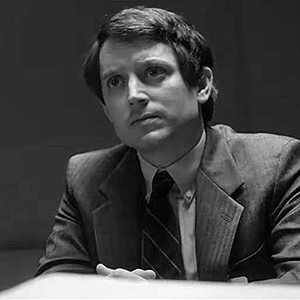
Bill Hagmaier
Ted Bundy seems to be the serial killer that is currently in style within the movie world. Attention had previously been focused on Charles Manson, but as his popularity has now waned, Bundy has taken over the mantle. The result has been a slew of documentaries and films that have placed the murderer at the heart of their stories with varying degrees of success. One such film that looks set to find itself amongst the top tier of movies inspired by Bundy, is Amber Sealey’s No Man of God.
Based on transcripts between FBI agent Bill Hagmaier and Ted Bundy, No Man of God charts the relationship between the two men across the years leading up to Bundy’s execution. No Man of God shifts the perspective from the charismatic and borderline glamorizing portrayals of Bundy to analyze the man for exactly what he was; an individual with an appetite for extreme violence who used all skills at his disposal to achieve his goal. Told through a series of meetings, Sealey’s movie distances itself from many of the others on the market by focusing solely on the aftermath of Bundy’s terror, allowing us to view him in a stark light after the facts have been revealed.
There are two things that make No Man of God a riveting watch: the performances and the production design. Whilst one would typically hope that the former is a strong component of any film, the latter is often forgotten about and overlooked. Both elements are effective here, with No Man of God told primarily via interviews between the two men. Bundy being incarcerated means that there is only one location for these talks to occur and seeing the same room time and time again could become tedious and repetitive. Yet Sealey and her team have put in the work to ensure that these encounters are mesmeric and engaging each time over. If you pay close attention, you’ll see that there are subtle tonal shifts in the color of the walls, that as well as portraying passages of time, also cleverly set the tone and mood of the relationship between Hagmaier and Bundy. This is further reflected in the costumes, the pair initially beginning in contrasting colors before slowly sharing colors from the same color wheel, emphasizing how the two are getting closer to one another. There’s enough material for an entirely separate article just looking at the colors, how they change and what they mean. Put simply, these components are well worth keeping an eye on.
From an acting standpoint, neither Elijah Wood who plays Hagmaier nor Luke Kirby who plays Bundy put a foot wrong. Each inhabit their role perfectly and the interplay and chemistry between them sizzles. Big chunks of the film rely on just the exchanges between the two and each brings their very best work. The first meeting between Hagmaier and Bundy is electric and the back and forth is like watching acting gymnastics. It has been a while since there has been a film that has been so performance led and in an ideal world, both of them would be in contention for the big awards.
Helping keep momentum, Sealey also utilizes her camera to tell aspects of the narrative. With such brilliant turns from the leads, a filmmaker could become complacent and simply lock off the camera and let the talent shine. Sealey opts instead to enrich the performances by accompanying their scenes with a camera that keeps circling the table, shifting from person to person, drawing the viewer into their dynamic further and further.
No Man of God revolves around its performances and utilizes cleverly thought out technical aspects to create a Bundy-focused, but not centric, tale that offers a fresh perspective on an otherwise over-saturated topic.
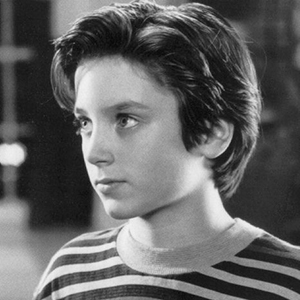
North
“North,” a playful modern fable about a boy in search of new parents, doesn’t always work, but much of it is clever in amusingly unpredictable ways. Mr. Reiner’s daring is a great comic asset, and it’s very much in evidence here. So evident, in fact, that “North” has the scattershot energy of a Mel Brooks farce: before the audience can be sure whether one gambit really works, this film is on to the next one. It’s hard to resist a comedy that’s so full of surprises and so eager to please.
Based on a slender novel by the comedy writer Alan Zweibel, and written by Andrew Scheinman, “North” unfolds in a fast, jaunty style. A string of quick glimpses describe North’s happy-looking life in the fourth grade while also revealing trouble in paradise.
North (Elijah Wood) looks like a big success, but his parents (Julia Louis-Dreyfus and Jason Alexander) don’t understand him. Nor do they even notice him. North’s father is much too interested in his career as an inspector of pants, which is the kind of notion Mr. Reiner knows just what to do with. All he needs to show is a quick glimpse of the pants factory, where North’s father (one of many imaginative pants testers) tries out pink and blue evening pants by feigning ballroom dancing.
Another nice sight gag presents North on his way to the secret place where he goes when he wants to be alone. Through the woods, past a treehouse, North wanders the countryside until he winds up inside a furniture store at a shopping mall, where he can brood undisturbed in a nice big armchair. It’s there that he meets Bruce Willis, an Easter Bunny full of advice and badly in need of a shave. Mr. Willis, lending the film a touch of hip insouciance, turns up in many guises throughout the film and makes a nicely laid-back guardian angel.
North decides to seek freedom from his family and roam the world in search of new parents. Naturally, he can’t do this without a lawyer (Jon Lovitz, who shows up in school with his client and advises him not to answer a question about the inventor of the cotton gin). And he can’t do it without generating public interest: telephone operators are seen fielding calls from prospective parents who want to know everything about North. “Don’t even get him started on the Warren Commission,” one operator advises.
Much of the film strings together North’s geographical exploits, which take him to places including Texas (Dan Aykroyd, Reba McIntyre, shades of “Dallas” and “Bonanza”), Alaska (Kathy Bates and Graham Greene in an igloo with a garage-door opener) and Pennsylvania’s Amish country (Kelly McGillis and Alexander Godunov, who give a reprise of their “Witness” roles and scare North with an offer to make him part of their solemn brood). Some of these moments are a lot less funny than others. The film’s comic range goes all the way from tasteless jokes in Hawaii, where North’s prospective parents want to use his bare rump on billboards, to a quick, side-splitting scene in Paris, where North sits with a beret-wearing couple watching Jerry Lewis on every television station.
Mr. Wood is currently the most natural, confident child actor of his generation, but he’s not always an ideal straight man. Too many of the tall tales in “North” require him to sit still and just flinch in disbelief. However, he’s very likable throughout, and Mr. Reiner has surrounded him with a good deal of comic relief. The film gets some extra energy from Alan Arkin, turning himself into Sid Caesar to play a wild-eyed judge, and Mr. Lovitz, sleazy as ever and better used than he was in “City Slickers II.” Mr. Alexander and Ms. Louis-Dreyfus also have some funny moments, even if they spend much of the story installed in the Smithsonian, enjoying “the longest simultaneous coma in medical history.”
“North” also has a subplot in which the hero’s power-mad classmate, a venal pre-yuppie named Winchell (Mathew McCurley), schemes against him. Children may enjoy this character, but there’s a lot for children to enjoy in “North” anyway. Aside from being the least original part of an otherwise inventive story, this conventional twist bogs down the film in other ways. There are enough large, venal yuppies on screen these days. We don’t need small ones.
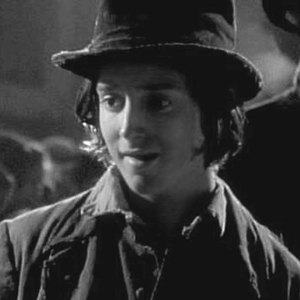
The Artful Dodger
When The Wonderful World of Disney was relaunched in the fall of 1997, Oliver Twist was one of the first films made. The telemovie is based on the book by Charles Dickens, whose rich characters and stories have been ingrained in public consciousness through countless literature classes and hundreds of film adaptations and reimaginations.
This particular filming of Oliver Twist remains fairly true to the text, and a faithful adaptation of such a good book can’t be all that bad. The stories open in the North of England, in the year 1825, as a desperate woman gives birth to a son, to whom she manages only to pass a bit of advice and a golden locket before she dies. Six years later, the film provides a glimpse of Oliver leading an unpleasant life in a workhouse. Six more years pass, and Oliver is still struggling amidst hordes of other poor English boys under the shelter of the tough Widow Corney.
At this age of 12, Oliver (Alex Trench) makes the mistake of asking for more food, and soon Widow Corney shows him the street with the least amount of tenderness possible. After managing to steal back his locket, Oliver runs off, orphaned and pennyless, to face the world on his own. His brief travels lead him to the bustling center of London.
There, the first person Oliver has the good fortune of encountering is Jack Dawkins, or as he’s more readily known, the Artful Dodger (Elijah Wood). Dodger welcomes the pennyless Oliver into his gang of young pickpockets, a type of Lost Boys who are living (and stealing) under the guidance of Fagin (Richard Dreyfuss). Fagin treats his pint-sized thiefs well, but he wears his flaws on his sleeve, and his values are clearly questionable. As far as he’s concerned, Fagin isn’t stealing, but merely redistributing the wealth in the vein of Robin Hood.
Of course, beggars cannot be choosers, and as Fagin’s place is the only home Oliver can hope for, he accepts it. Still, the boy is reluctant to take part in the “work” that the other boys do. When the time comes for Oliver to make his first steal, it results in disaster, and the orphan is taken into custody. But soon, with the help of his pickpocket target Mr. Brownlow (Anthony Finnegan) and his kind niece Rose Maylie (Olivia Caffey), Oliver not only is out of trouble with the law, but he has a nice home and people who care for him.
Meanwhile, worried that Oliver might “peach” on their operations, Fagin and his associate Bill Sikes (David O’Hara) come up with a plan to get the boy back. This sets forth a situation where Oliver is torn between his two new homes, one offering financial stability and parental figures, and the other representing the only place that took him in.
The film does a fine job of capturing the atmosphere, and the accurate costumes and locations show a level of detail unusually high for a telemovie. At the same time, there is little to make this Oliver Twist stand out from other adaptations, without the gimmick of a full-blown musical form (Oliver!) or a contemporary twist (Disney’s own Oliver & Company).
As a protagonist, Oliver is mostly passive, and so if young Alex Trench doesn’t make a great impression on the viewer, one isn’t really necessary. More memorable characterizations are turned in by David O’Hara as Bill Sikes and Antoine Byrne as his girlfriend Nancy. Here, Sikes is particularly and genuinely menacing, grounded in a humanity which makes him all the more fearful. The intrigue and depth of the Artful Dodger character provide another strongpoint for the film, even if Elijah Wood is too old for the role.
With his prosthetic nose, mole, and scrawny facial hair, Richard Dreyfuss clearly was trying to show his acting range, but his performance always feels just that: a performance. Dreyfuss, who also co-produced the film, is also so coarse and over-the-top that it’s tough to see any good in his Fagin, missing the ambiguity of the character as written.
Still, the film succeeds entirely due to the strength of its source. This tale, like many of Dickens’ fiction, resonates with modern audiences. Its well-crafted plotting and properly developed characters would enable even the most by-the-numbers adaptation to strike chords and hit some right notes. Even condensed to a 90-minute made-for-TV format, Dickens’ tale remains endlessly riveting and the world of impoverished, likeable criminals stays alluring.
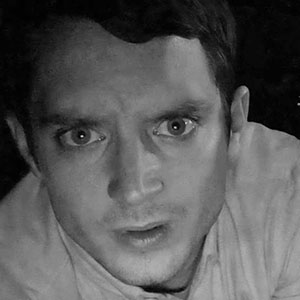
Nick Chambers
Given the recent spate of celebrity cell phone hacks, Open Windows seems especially prescient. Here’s a movie that imagines such a scenario and then takes it to the umpteenth degree. Writer/director Nacho Vigalondo specializes in endlessly twisty sci-fi with a down-to-earth feel, such as Timecrimes and Extraterrestrial. This time, he lets his craziest impulses run free, resulting in an irresistibly twisted work of technology-based imagination.
Elijah Wood plays Nick Chambers, the proprietor of a website dedicated to actress Jill Goddard (Sasha Grey). He’s been lured to the annual Fantastic Fest in Austin, Texas, under the ruse of winning a contest that will allow him to meet the object of his devotion. Sitting alone in a hotel room, he is contacted via computer by a guy named Chord, who claims to be Jill’s manager, informing him that Jill has cancelled their meeting. To make up for this, Chord sends Nick a hack that grants him access to her cell phone and computer, saying that the poor guy may as well get something out of the deal, even if it is only a small bit of revenge. It soon becomes clear, though, that Chord has much more sinister intentions, and the increasingly hesitant Nick is the tool with which he intends to carry them out. The unseen hacker forces Nick to breach Jill’s security further and further, until both their lives are in danger.
It’s a clever plot that gets mileage out of modern technological fears. Here’s the kicker, though: Open Windows takes place entirely on Nick’s computer screen. The whole movie is from the POV of someone looking at his laptop. Different windows pop up, each one showing a different perspective on the main action. Jill’s hacked devices, Nick’s hacked video camera, and his built-in webcam provide just some of the feeds that we see. Emails, screenshots, and security cam videos are also used. Sometimes the camera pans out so we can watch multiple things happening at once; other times, it zooms in so that we focus on just one window. Vigalondo masterfully weaves around, using the technique to create continually-mounting, fast-paced tension that starts immediately and never lets up. This is tour de force directorial work.
Two significant themes are at play in Open Windows. The first is how inducing panic makes it easier to control someone else. Chord convinces Nick to compromise his ethics just far enough that he could be in trouble if anyone uncovered his piracy. Now on the hook, increasingly extreme measures seem necessary to Nick in order to cover his tracks. This allows Chord to virtually violate Jill by proxy. The other big theme is invasion of privacy in this digital age. We’ve become reliant on devices that can be exploited, meaning that we’re never really 100 percent safe. Of course, the movie takes this to an extreme, yet it’s a credible extreme because we already know that things similar to what occurs here have taken place in real life. In other words, it’s realistic enough to be uncomfortable.
Open Windows has many twists and turns that catch the viewer off guard. It wouldn’t be fair to give anything away, but suffice it to say the movie is more than people sitting in front of computers. The action moves far outside of Nick’s hotel room and into the streets, an automobile, and even Jill’s bedroom. And the movie is just as much a character piece as it is a thriller. Elijah Wood gives a strong performance as Nick. Between this and the equally loopy/tense Grand Piano, he’s become a master at playing nervous guys taking orders from unseen figures. Wood provides a moral center for the movie, showing how Nick starts off complicit with Chord’s scheme, only to eventually find his own ethical limit. The revelation, though, is Grey, who does wonderful work playing a character who starts off oblivious and gradually grows terrified as she realizes that she’s at the center of something deeply unnerving.
Wood and Grey are terrific, and so is just about everything else. The last two plot twists are perhaps a bit too absurd, but even then it’s hard not to get swept up in the movie’s crazy energy and visceral punch. Open Windows is ingeniously structured, masterfully executed, and enormously entertaining.
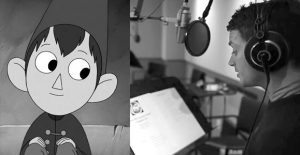
Wirt
Over The Garden Wall is not only the first animated miniseries for Cartoon Network, but it might be the first kids animated TV miniseries ever. There’s been specials and one-offs, and there’s been unfinished-series and one-season wonders, but unless Cartoon Network orders a second season out of the blue, this is a legit miniseries: Ten 12-minute episodes telling a fully self-contained story. I doubt Cartoon Network is experimenting with something akin to the British model of television here, but the network has been messing around with different types of programming: the nonsensical “Mixels” shorts, the PowerPuff Girls reboot episode that got picked up for a full series, the weird but well-animated superhero special from The Looney Tunes Show.
It also seems like Cartoon Network is trying to step away from the ‘signature style” that’s been propping up the network for the past couple of years: that big, round eyes, noodle-armed, “notebook doodle” look. Sure, there’s enough variations among them to make each unique and special, but on the whole, they’re a far cry from the Cartoon Network output in the late 1990s and early 2000s: Johnny Bravo, Courage The Cowardly Dog, The Grim Adventures Of Billy And Mandy, Dexter’s Laboratory, Codename: Kids Next Door, Ed, Edd, And Eddy, and Foster’s Home For Imaginary Friends. (This isn’t a knock against current shows mind you, but they’ve been packaged together on Thursdays for a reason.) It hasn’t always worked out; Beware The Batman, Green Lantern, Riders Of Berk, and The Looney Tunes Show were all dropped unceremoniously, but I’ll give the network props since they are still trying (Sonic Boom!).
Still, that style is Cartoon Network’s go-to look, and Over The Garden Wall is the creative brainchild of Patrick McHale (who worked on The Misadventures of FlapJack and Adventure Time). McHale’s miniseries is influenced heavily on early European folklore, along the lines of the Brothers Grimm, in which two siblings get lost in a confusing, terrifying, fantastical world. The reason or explanation for how or why they got lost isn’t quite the point: It’s a show about growing up and maturing in a world beyond a young person’s understanding. Over The Garden Wall is about coming into a world of societies and individuals that seem so weird, amazing, dangerous, and off-kilter. It’s also one about dealing with strangers, mortality, regret, fear, sadness, depression, wonder, imagination, and love.
And what a world: The Unknown is hauntingly beautiful, with fantastical, classical backgrounds and rich colors reminiscent of a turn-of-the-20th-century paintings. Locations are designed with a keen eye so they’re both familiar and unfamiliar, exhibiting the sense of early 20th century children’s literature and folk art. Each episode exhibits a specific aesthetic that reflects a specific artistic style – “Schooltime Follies” resembles the works of Richard Scarry (complete with anthropomorphic animals in schools); “Songs Of The Dark Lantern,” riffs on the everlasting animation of Max Fleischer, including a great Betty Boop knockoff as the barkeep-tweaked to the series unique, quirky brand of humor.
Greg, Wirt, and Beatrice are the young charges that are thrust into this setting, each of whom fit a specific age group, and in their own ways, represent a kind of transformation as they travel from place to place. Greg (Collin Dean) has a youthful spirit that keeps him optimistic, and his adorable songs and constant amazement at even the most unsettling images a delight to behold. Wirt (Elijah Wood) is the cynical teenager, yet the show does a fantastic job balancing him between his moody, stubborn tendencies and his waning childhood wonder. Then there’s Beatrice (Melanie Lynskey), the series’ standout character by far. A mix between an older sister and a self-serving tourist, Lynskey steals the show with her amazing putdowns and passive-aggressiveness, smartly avoiding overdone sass or sarcasm.
The storybook setting, with its bizarre cast of creatures and characters (which includes a stodgy, rambling woodsman voiced by Christopher Lloyd, and an eccentric, rambling millionaire voiced by John Cleese), forces the three to bond, and as the series goes along, events – particularly their conflict with The Beast (voiced by Samuel Ramey), begins to test their relationship, as secrets are exposed and revelations are made. Avoiding spoilers, their specific attitudes and behaviors (and the testy, odd interactions among them) are given context, deepening the three and opening them up like the very imaginative fairy tale they find themselves in. The title cards of each episode add to the narrative’s “literary” design, with slow, smooth fades over bold fonts, complete with the chapter number. In some ways, these bookends evoke the nifty aesthetics of classic silent animation (an aesthetic brilliantly invoked in a later episode, to incredible and harrowing results).
Incredible and harrowing are the strongest words to describe Over The Garden Wall, as each episodes bridges between warm fall colors to evoke comfort and comedy, and dark black and greys for terror and drama. Credit to art directors Nick Cross and Nate Cash, seamlessly able to bounce back and forth between the two color palettes, sometimes in the same episode, to reflect the mindsets or the characters, or the specific mood of the scene. Likewise for the music: Each chapter comes with a perfectly tailored score emphasizing the whimsy and mystery of the moment, composed by the gypsy-folk band The Petrojvic Blasting Company.
With such a perfect blend of mood, atmosphere, story, and characterization, Over The Garden Wall’s 10 episode run will leave you wanting more, but like every great fairy tale, it’s a story that knows when it’s over. In the midst of its run, though, viewers will no doubt be caught up in the show’s fantastic locales and its lessons. And like any great fairy tale, it’s one worth experiencing again and again.
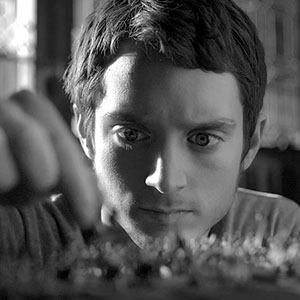
Martin
In The Oxford Murders, the universe seems to have presented an excellent opportunity to a young American man, who has a thirst for knowledge, for cracking the numbers game, decoding Life itself. Except that the stakes are very high, and the count is done in human bodies. The young man is Martin (Elijah Wood), the setting is the wilds of Oxford, and the don who is supposed to help him walk the magic road of numbers is Professor Arthur Seldom (John Hurt).
The first murder occurs in the very house Martin is staying in and in a macabre way serves to bring Martin closer to Seldom, who had humiliated him in the first place and had refused to take him on as a student. Conveniently, the murder takes place before a disappointed Martin was preparing to go back to his native America, and just as Prof. Seldom arrived on a visit at the door of Martin’s landlady, Mrs. Eagleton (Anna Massey). Fate orchestrated them to meet at her door-step, immediately after the murder. What’s more, they receive a hint that there would be more.
The game is on, to catch the killer before the body pile becomes a mountain. Of course, the police are all at sea, as Martin and Prof. Seldom speak in a code language that only mathematicians seem to understand. But is life as simple or as well organized as mathematical formulas? Martin becomes entangled in more than just spaghetti with a local nurse, Lorna (Leonore Watling). The dead woman’s daughter, Beth (Julie Cox), seems to have her own ideas, as to the missing ingredients in Martin’s love life. The fast-paced plot takes us hurtling through various scenarios and suppositions, with every major character joining the suspects line, while the spectators lean forward eagerly to decode the film, forgetting to dutifully munch on their popcorn and their drinks go warm.
Basing the film on Argentinean writer, Guillermo Martinez’s book, The Oxford Murders, director, Alex de la Iglesia takes the audience on a whirlwind tour of the labyrinth of the university town, using the minds of Seldom and Martin as jumping pads. The plot twists and turns as much as the narrow streets of Oxford. The walls start to close in on Martin in the shape of the tight little University community. Can this modern Theseus get out of the labyrinth, without the proverbial ball of thread?
The film marks a new phase in the talented director’s career, who encourages audiences as much to laugh with him, as at him. Some of his long camera pans with sudden turns to capture an interesting moment are a spoof on badly done thrillers. However, just like The Da Vinci Code or Zodiac, psychological thrillers are very difficult to adapt for the screen, as most of the action is cerebral. Nevertheless, di la Igelsia and Jorge Guerricaechevarr a, have done quite a good job, as the script is very tight with never a dull moment. Flashes of humour keep the whole subject light, so that it doesn’t sink under the weight of its own seriousness.
Mysterious codes, and deep philosophical questions are explored in the context of our modern, very mobile, everyday life. Actually shot in Oxford, the director succeeds in keeping the background realistic, and does not polish or plasticize it. This could be due to the fact that it is an independent film, funded mainly by European companies.
The only American, Elijah Wood, an internationally recognizable face, has once again chosen an indie film, with a meaningful story. He has tended to steer away from mindless romantic comedies and seems to have refused to capitalize on his good looks alone. He gives a convincing performance as the bright, young student, grappling with a lot of life issues at once. There is always a risk in playing this kind of character. Done in a sweeping, over the top manner, it becomes too loud and unconvincing. Too much understatement can make it sink. Elijah walks a fine line in keeping his performance realistic in a lively way, so as to keep audiences hooked.
John Hurt seems to be born to play the arrogant university don. His intelligence is surpassed only by his ego. He plays Seldom with a judicious mixture of outward confidence and hidden insecurities. Leonore Watling is well cast, as a bait to distract the attention of male audiences. Julie Cox plays her role very well as a bitter young woman. Anne Massey is singular in her performance, so much so, that one wishes to know more about Mrs Eagleton, her character.
The film is a case in point that it is not an inflated budget that makes for a high-quality film, but well cast, talented actors, pooled effectively by a creative director lead to good film-making. More audiences deserve to see the film.
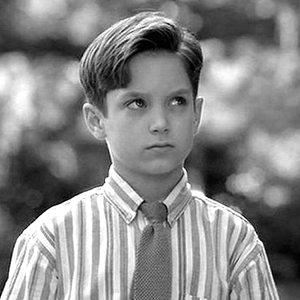
Willard Young
Every so often, among the summer blockbuster action-adventure flicks or romantic comedies, a quiet little low-key film slips through without hardly receiving attention. For the audiences who fill the aisles for the latest slasher movie or teen comedy, Paradise would probably hold no interest whatsoever. A thoughtful, deliberately-paced drama, it fell largely under the radar in its opening year despite featuring popular- at least at the time- stars Don Johnson and Melanie Griffith. But some caught Paradise either at the time or, like myself, years later, and discovered a nice little movie about four people, two adults and two kids, who grow emotionally through their relationships with each other.
If you’re looking for an action movie, or a comedy, or a thriller, Paradise is not the movie for you. Almost nothing in the way of action occurs, and the pace on the whole is deliberate, occasionally running a little toward the sluggish. But it’s a nicely-constructed little drama built around a familiar theme. Director Mary Agnes Donoghue has a human touch; Johnson and Griffith have a dramatic, effective scene together in which they finally address issues that have gone unsaid for far too long, and a number of the smaller bonding moments between the characters are genuinely touching. The film makes good use of its natural locations; the marshes, the slow-moving river opening into the sea…it all seems to fit the thoughtful, gently flowing tone of the story. At first I thought Paradise moved a little slow, but after a repeat viewing I came to admire the way it takes its time to say what it wants to say. Too many movies these days feel rushed. Paradise lets its story unravel at a gracefully leisurely pace. It hits a few missteps; Donoghue sometimes loses the intimate human feel and gives in to the temptation to go for the melodrama that interrupts the flow of the story like a rock thrown into a pond. The most obvious example is an overly dramatic, contrived climactic scene that feels tacked-on to supply the movie with an exciting ending when it requires no such thing.
Another thing Paradise has going for it are the performances, which capture the right low-key note in keeping with the tone of the story. No one is over-the-top, and no one hogs the camera. The four principal actors craft down-to-earth characters. Don Johnson, best-known for the popular TV series Miami Vice, proves himself with this and other meaty dramatic roles as a capable, sometimes underrated actor. Ben is a cynical, somewhat caustic man, but his indifferent demeanor hides a genial nature hardened by emotional wounds. He doesn’t make a very welcoming first impression, but he soon warms to Willard, and both he and Lily seem to come a little more to life in his presence. Melanie Griffith gives an approximately equal performance, effective as a wounded woman who has closed herself off to keep going. To Ben, she is the Ice Queen, but her lifeless countenance is a mask for a person living in quiet pain. At the same time, Griffith keeps Lily from seeming cold, instead coming across as a naturally warm woman who has retreated within herself because it’s the only way she can keep going. We see that Ben does love her, but isn’t willing to join her in what he sees as her numb, walking-dead existence.
Unlike some less talented child actors, Elijah Wood does not wear out his welcome by trying to be excessively cute (although his large eyes are preternaturally serious face does give him a slightly unconventional appeal). In fact, Wood gives the most low-key and restrained performance in the film, often conveying emotions more with his big expressive eyes than his dialogue. He’s not a typical ten-year-old boy; he seems solemn at first before loosening up, and even then his expression is often serious and observant. But Wood shows the sweet boy who wants and deserves to be loved beneath the introverted demeanor, and gives a quiet, serious performance without resorting to cutesy affectations. Also charming- in a more immediately obvious way- is Thora Birch as the tomboy Billie, spunky, feisty, natural, and exceedingly appealing. Birch and Wood were both nominated for the Young Star Awards, and she gives the more energetic, attention-getting performance, more flamboyant than the low-key Wood, but each is solid, and I would be hard-pressed to pick the superior one. When Birch is allowed to be her precocious self and Wood to follow his quiet acting style, both are splendid, but they sometimes seem a little forced when the script slips into one of its more contrived moments. Certain scenes have the feel that perhaps Wood was pushed into acting a little more dramatically. But there is a real rapport between Elijah Wood and Thora Birch; they have a natural, unforced chemistry, and seem to be leveling with their characters rather than trying to ram their cuteness down our throats.
At its core, Paradise is a fine drama, not a great film, but sometimes funny, sometimes touching, and nicely-acted.
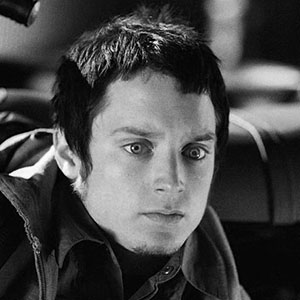
David
Fragmented and inconsistent by definition, omnibus movies will always meet with mixed reactions. 1989’s New York Stories bore fruit for Woody Allen and Martin Scorsese but saw Francis Coppola pelted with rotten tomatoes. More recently, Grindhouse finds both Quentin Tarantino and Robert Rodriguez trying to erase the memories of the condemned Four Rooms, but only QT’s half is receiving plaudits.
With eighteen tales to tell, Paris, je t’aime is more ambitious than most and could well have become a case of too many cooks. Thankfully, the strong segments outnumber the weak.
One way or the other, each story is about love: lost or found, craved or shunned, coming or going, natural or, in one instance, supernatural. And unsurprisingly, the tales cover a spectrum of tones and styles.
At the melancholy end, a Mexican nanny (Catalina Sandino Moreno) is sent on a brief, ironic journey by Walter Motorcycle Diaries Salles; despair falls upon a husband about to leave his wife (Miranda Richardson); and most tragic of all – a Nigerian immigrant is laid low after simply following his heart.
Hope springs from Gurindha Chadha’s interracial romance, as well as the dreamlike epiphany for grieving mother Juliette Binoche, and the play-acting between boredly-weds Bob Hoskins and Fanny Ardant (though divorcing couple Ben Gazzara and Gena Rowlands have moved on to younger models). Tom Tykwer and Alexander Payne hardly stretch themselves, with Natalie Portman’s aspiring actress proving that love is blind in the former’s retread of Run Lola Run and the latter simply doing a gender-flip of About Schmidt.
Smiles come from a playful meeting of mimes in Sylvain Chomet’s Eiffel trifle, and the Coens giving tourist Steve Buscemi a typically sharp and quirky lesson in Parisian culture on the Metro. There are surprises, too. Cuaron’s one-take effort featuring Nick Nolte and a younger woman (Ludovine Seigner) doesn’t go where you expect, and Elijah Wood appears in an episode ripped straight from the pages of Sin City. Duff notes include the arty Oriental nonsense from Christopher Doyle, Wes Craven’s irritating cemetery set-to for Emily Mortimer and Rufus Sewell, and an uninspired gay flirtation from Gus Van Sant.
Ultimately it’s all a matter of taste. A meal of hors d’oeuvres is never going to be completely satisfying, but even the most picky eaters should find something they like. Bon Appetit.
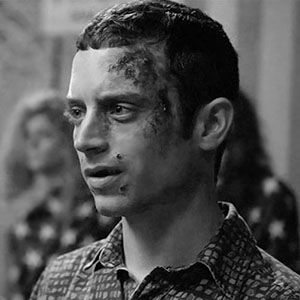
Johnny Shaw
Pawn Shop Chronicles is comprised of a trio of interconnected shorts that appear to have been inspired by the pivotal scene in Pulp Fiction where Bruce Willis’s Butch and Ving Rhames’s Marsellus stumble into a pawn shop and suddenly find themselves trapped in a horror film. Director Quentin Tarantino has built his career on such tonally jarring transitions, of course, and with Pawn Shop Chronicles, screenwriter Adam Minarovich has let himself run wild in attempting to up the ante on the number of genre switcheroos that an audience will accept in any random 10 minutes of a film’s running time. At times, the film resembles an extremely broad and violent episode of My Name Is Earl, only to offer, in other instances, poetic and suggestively transgressive imagery that faintly recalls Alejandro Jodorowsky and Alex de la Iglesia’s films.
Minarovich and director Wayne Kramer seize on the sinister pall that hangs over pawn shops, which obviously profit from others’ desperation, and spin a dark comedy of broken American dreams that follows a day in the life of a pawn shop owner (Vincent D’Onofrio) as he inadvertently ruins all of his customers’ lives. The first story, which features an unusually game Paul Walker as a meth head who meets a flamboyant end, is the least interesting on paper, but Kramer enlivens the proceedings with purposefully showy aesthetics that invest the tiniest of gestures with a gonzo energy that’s reminiscent of a Tex Avery cartoon.
The remaining tales, however, have a sick-joke grandeur that suggests what might have happened if O. Henry had ever written for EC Comics. The second story is a perverse wowzer that follows a recently married man (Matt Dillon) as he stumbles upon the truth of his first wife’s disappearance, which sends him on a surreal journey that eventually leads to the home of a very disturbed individual played by Elijah Wood. The ending, which parodies the suggestion of ownership that’s latent in the classic marriage arrangement, has unexpected bite.
The final story has an awkward opening that’s marred by Brendan Fraser’s unfunny mugging as an Elvis impersonator, but it builds to a commendably bizarre climax that features an army of recently liberated sex slaves marching into a country fair to a rendition of “Amazing Grace” as their naked bodies are wrapped in American flags. These images are so loaded you can probably locate whatever subtext corresponds to your ideology, but Pawn Shop Chronicles is probably best understood as a self-dare on the part of the filmmakers, who revel in the freedom that a limited theatrical release presumably allows. Kramer thankfully refuses to cloak his excessiveness in hedge-betting self-consciousness and the result is a gratifyingly disreputable B-movie blow out.
PAWN SHOP CHRONICLES features three different stories involving revenge, kidnapping, meth labs and murder. Each revolves around an object bought and sold at a local pawn shop. With a trio of racists, an Elvis impersonator and a man searching for his missing wife, there is a ton of un-PC fun to be had.
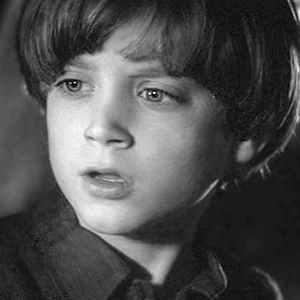
Michael Wright
At first, “Radio Flyer” looks to be a pleasant, if innocuous, story about childhood. The father of two, Mike (Tom Hanks) is spinning a yarn for his kids about his youth, a time of juvenile ups and downs spent with kid brother Bobby, their divorced mother and a dog called Shane. Then Mike goes back in time, to California, 1969. The real story becomes apparent. Something new — and bracing — takes over. Something frightening, something close to home.
The younger Mike (now played by Elijah Wood) and Bobby (Joseph Mazzello) live in their own world. As the older Mike recalls, there are several things all kids know — and adults don’t. For one thing, monsters exist. For another, you can actually kill someone by aiming your cocked fingers at them and making a gun noise. There are other childhood secrets: You can achieve any feat of strength merely by wearing a superhero cape, or parachute from any height clutching an umbrella. The biggest secret, he says, is the ability to fly.
The kids’ mother (Lorraine Bracco) loves her children but is completely unaware of their imaginative universe. When she remarries, she has no idea what new monster she has brought into their lives. Mike and Bobby, stalwart allies against the treacherous adult world, don’t dare bring her up to speed on the man (Adam Baldwin) they call the king of all monsters.
Bracco, working a summer-long, double-shift job as a waitress, has no idea what is happening. It’s better not to reveal any more than this but, for the kids, the situation gets more desperate. Their plans to build a flying machine from their Radio Flyer wagon, which they call The Big Idea, becomes something of a race against time.
What counts in “Radio Flyer” is its evocative texture. Director Richard Donner and screenwriter David Mickey Evans have created a very real, tragic world between the brothers. The help they give each other — and the mature love that develops between them — is immensely touching. When things are going wrong, they instinctively reach for each other. At school one day, their stomachs suddenly start hurting. They mutually sense something’s amiss. With instant agreement, they rush home to find out what it is. They’re both far too young to have the worries they do. By default, Mike is Bobby’s protector, and Bobby is haunted by a troubling vision.
“He knew about a special secret all kids know,” says the older Mike. “Only he knew more. A lot more.”
What Bobby knows is the poignant crux of this movie. This drama details what he and Mike, with their limited resources, do about that knowledge. As the children, Wood and Mazzello give unforgettable performances. There’s a powerful sibling relationship between them that seems more than merely scripted. There’s also much in this movie about what flying represents, and what building this Big Idea is really about. But that’s for you to find out. It all makes for a soaring and tearful ending.
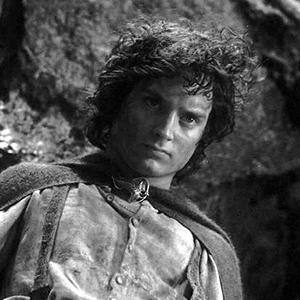
Frodo Baggins
Saying that this film starts where `Two Towers’ left off is somewhat misleading, for the film starts a great distance from the walls of Helm’s Deep. `Return of the King’ opens with a flashback of Smeagol (Andy Serkis) obtaining the one ring of power and an origin of his deterioration into the creature Gollum. This opening recaptures an emphasis that was somewhat lost within the epic battles of `Two Towers,’ at that’s the ring. The first installment, `The Fellowship of the Ring,’ provided heaps of exposition on the ring’s importance and influence, and in `Return of the King,’ we see it pay off, big time.
After the armies of Isengard have been defeated due to an allegiance between Theoden (Bernard Hill), the king of Rohan, and the elves, the main threat to middle earth is now concentrated in the kingdom of Mordor, controlled by the dark lord Sauron. Sauron has turned his eye towards the realm of Gondor, the last free kingdom of men, and the wizard Gandalf (Ian McKellan) must warn Denethor (John Noble), Steward of Gondor of the impending attack, while Aragorn (Viggo Mortenson), heir to the throne of Gondor, and Theoden gather men to aid against the armies of Mordor. The dark lord Sauron needs only to regain the one ring of power to conquer all of middle earth, and two hobbits, Frodo (Elijah Wood) the ring-bearer and Sam (Sean Astin), must continue their journey, directed by Gollum, to Mount Doom, the only place where the ring can be destroyed. Got all that? If not, you need to bone up on your `Lord of the Rings’ before expecting to follow this film.
Since all three epics were filmed simultaneously, each individually has the feel of being part of a larger picture – except for this one. `The Return of the King’ is just too big, the most epic of a set of epic films. Now that director Peter Jackson has brilliantly constructed the characters and plotlines throughout the first two films, he puts them to use.
All of the characters have their best moments within this film. The pair of mischievous hobbits, Merry (Dominic Monaghan) and Pippin (Billy Boyd), are no longer the tree ornaments they were from `Two Towers,’ but are split-up, and take their characters in completely new directions. Aragorn, played with an unmatched sense of honor by Viggo Mortenson, is about to meet his destiny as the future king of all men, while Andy Serkis continues his expert portrayal of Gollum (Serkis’ provided not only the voice of Gollum, but also assisted during production by acting out the scenes of the computer-generated character with his fellow actors).
However, the real acting triumph of the film is Elijah Wood as Frodo Baggins. He continues his descent into corruption with an incredible talent that many could not pull off. Wood’s performance is so critical to the film because it determines the ring’s power to corrupt, which, needless to say, is absolute.
The first two films established Jackson as an incredible visionary, shooting vast landscapes from his native New Zealand. With `Return of the King,’ Jackson really gets a chance to show off. With, hands down, the most beautiful visuals of the trilogy, Jackson makes `Return of the King’ a gorgeous feast for the eyes, while never resorting to McG level over-the-topness. Jackson stays very grounded in his characters, not letting the effects tell the story, but only assist the wonderful dialogue and characters. Think of `Return’ as a mix of `Fellowship’ and `Two Towers,’ with enough action and character development worthy of ending a film event of this magnitude.
The bottom line, fans of the films will not be disappointed. Hardcore Tolkien lovers might be upset by plot changes and interpretations made by Jackson and the other writers, however, it is unrealistic to expect a completely true adaptation of the novels, being that film is an entirely different medium. Despite the alterations, Jackson consistently stays true to the major themes and ideas from the original text, while adding some of the finest filmmaking ever put to screen. `The Lord of the Rings: The Return of the King’ is one of the most finely tuned and cinematically perfect films ever made. Not only the best of the trilogy, but a crowning achievement in epic filmmaking.
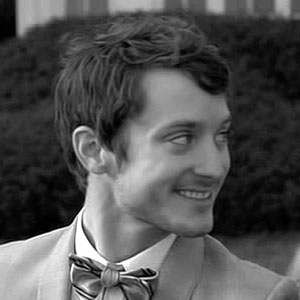
Chip Hayes
At first glance The Romantics gives the impression that it might be one of those trendy new value packed romantic comedies laced with bits and pieces of top talent aimed at getting fans in the seats but offers little in the way of good story telling. A good example being the dull “He’s Just Not That Into You” or the recent “Valentine’s Day.” Luckily the Romantics is not one of those types of films, in contrast it’s a true ensemble piece where the actors work stronger as a unit then alone. The casting by long time producer, first time feature length Director Galt Niederhoffer is near pitch perfect and the players work together seamlessly to create a smart story about the unpredictability of love and how we may get older and wander but some things just never change.
The Romantics are a crew of preppy (former J.Crew models from the looks of their cloths) late 20 somethings that come together on a Hamptonish Long Island estate for their friend Lila (Anna Paquin) and Tom’s (Josh Duhamel) wedding. Lila has asked her old college roommate and friend Laura (Katie Holmes) to be her maid of honor. This a rather devious gesture by Lila because Laura has a long standing history with the groom Tom. Of course with the old gang getting together again Laura must push through the torment and do her part at the wedding. The friends are all well aware of the tension between Lila, Tom and Laura and expect fireworks to fly before the the wedding bells ring. Tensions begin to build at the wedding rehearsal dinner before kicking off a wild night that finds old lovers reuniting and old friends rediscovering themselves.
The Romantics asks the question is the nostalgia of our past love just a sugar coated flashback or is that first true love the most pure and most enduring love? From what we can gather here, there is no clear answer only a process of trying to understand ones true feelings. The Romantics stays true to the process, allowing the events of the movie to unfold in a very honest and rewarding manner . Where other lesser films might try to force the jokes and push forward to a obviously predictable ending the Romantics is at its best when it focuses simply on people’s feelings and the raw emotion of the moment.
What is abundantly clear after viewing this movie is that Katie Holmes is a really great actress, not good, great. Believable, honest and fragile, in the role of Laura she elevates the material here and there leaves little doubt that she deserves consideration on her own merits sans her TomKat status. Additionally Josh Duhamel delivers a very rewarding performance, he brings a lot of charm and honesty to the performance. His chemistry here with Katie works incredibly well.
The entire cast all have their moments in the Romantics, however its hard not to see that many of the players here deserved more screen time and more chance for developmet. Elijah Wood in particular needed more face time, he is an absolute riot fest here. To add to that Dianna Agron of Glee fame turns out a great little performance as Anna Paquin’s sister in the movie. Strikingly gorgeous and infatuating on screen Dianna is a star in the making, her moments with Anna were gems. Fans of Malin Ackerman, Anna Paquin and Adam Brody will probably feel let down that each star didn’t receive a bit better treatment, however there are still little treats in each of the their performances which should satisfy most fans.

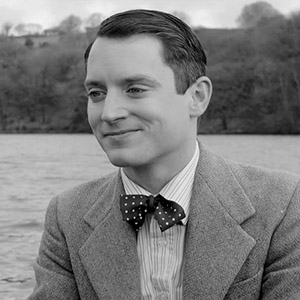
John Malcolm Brinnin
At times my poetic prowess reaches as far as “One Fish, Two Fish, Red Fish, Blue Fish.” Most prose-filled literature bounces over my head, but I’m not totally blind to the verse language.
Several movies have come along to awaken my vernacular intellect. Adaptations of Shakespearean works such as Hamlet, Much Ado About Nothing, Richard III, and Othello. Modern films like The Remains of the Day, Six Degrees of Separation, Agnes of God, Inglourious Basterds, even the rom-com Roxanne have dialog that’s swept from a Broadway stage dripping with idyllic narratives. Now I can add Set Fire to the Stars to this list.
My first impression of this movie took me to a place where I thought I should be marveling at the actors and sets in a stage play. The lines that leap from the screenplay make me grateful to be a fan of films such as this. Every now and then one comes along that utilizes speech in a way that makes it masterful.
Being a photographer, my second impression instantly made me revel at the glossy black and white cinematography. It’s punchier, brighter and crisper than any monochrome 1950s movie I’ve seen. I can’t get that image of New York City’s skyline with falling snowflakes out of my head. It reminded me of a snow-globe in which the city glowed and shimmered like the energetic place it is.
Other than the stark imagery, the performances are just as captivating. It’s both difficult and entrancing to watch Celyn Jones bring the poet to life. To see someone recklessly destroy himself as well as those around him should make one appalled. When Dylan is stripped from New York City and taken to John’s quiet country home, it’s like caging a wild lion. In an outtake he says to John, “It’s like a Presbyterian wake.” Dylan does get loose and has a unique way of alluring people to him. He also has a knack for alienating them. It’s not due to his celebrity, but his inclination with words and brash demeanor. Celyn as Thomas is a being who is poetry in motion. He’s both devil and angel, moral and corrupt, bitter and sweet, tears and laughter.
Elijah is suited well in this period piece with the look of a classic actor from the era in which the film is set. As opposed to Dylan, there’s not much known about John Brinnin. However, the way Elijah portrays the Harvard scholar makes us believe the literary critic to be reserved but holds a powerful and respectful status. We struggle with John every step of the way as he wants to be a colleague and advocate but instead is diminished to a caretaker and scapegoat. Despite all this John is still an admirer. In one scene he watches Thomas recite his poem “And Death Shall Have No Dominion” to the Yale big wigs. Dylan fumbles at first then settles in. The camera closes in on Elijah and you can feel the admiration in his eyes while the others show little sign of validation. Elijah loves the English language and its proper use so this film must have been a treat to work on. He delivers his lines just as eloquently as Celyn.
Together, Elijah and Celyn poured themselves into these men and brought a precarious relationship to the screen. One is loose while the other is restrained. John pushed Dylan as much as Dylan pushed John. The two were like oil and vinegar but when mixed properly, they delivered a savory retort. There was a bit of a montage of them working intently on their upcoming engagement at Yale. I would have loved to witness more of that collaboration and listened to how they discussed, agreed and bickered. It was a quiet battle between them and when all seemed good, one did something that destroyed what they had worked.
The supporting cast is great, composed of Shirley and Stanley (Shirley Henderson and Kevin Eldon), a married couple who live near Brinnin’s lake home coming in to have a wild evening of drinking and story-telling. Rosie (Maimie McCoy), a spunky little waitress in a diner, and Jack (Steven Mackintosh), John’s adversary from Yale who wants to see John fail knowing the attitude of Dylan. One of the stronger scenes is the apparition of Dylan’s wife Caitlin (Kelly Reilly). Throughout the movie there is a letter from her that Dylan refuses to open. It scares him to do so and that bothers John deeply.
When Caitlin appears to Dylan, she speaks and taunts him with her poetry on why he left her and their children and why he had to. This exchange arouses Dylan to behave in the manner John has been wanting him to act since they met. John is now upset by what Dylan’s wife may have written and said, “What did that woman say? What did she say that awoke you from your dream? I need to know. What is it she can scribble down in her violent, cheap hand that eclipses my entire being?” After they struggle, Dylan brings the movie to its purpose by saying, “Don’t open a book. Open a window.” explaining to John life is in right front of him.
It’s hard to believe they shot this film in 18 days. One would think it took months to complete if not for the dialog alone. Not knowing Thomas’ work, it doesn’t bother me that his poems are not recited in their entirety. I’m glad in fact. As I said, most poems need to rhyme for me to understand them, but just enough of them are spoken to help the screenplay along.
If this were to be in the running at the Oscars, I would definitely give them a nod for cinematography and screenplay. I’m glad Elijah chooses projects like this even though it may not be seen by many. Sooner or later, I believe those actors who jump at blockbuster films will tire of them and will want to have a go at smaller, more meaningful pieces. Elijah already has them beat.
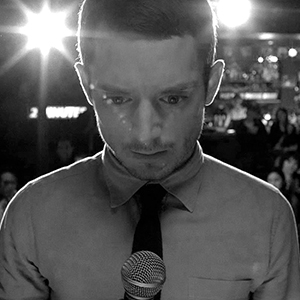
Reuben Stein
When most people think of Elijah Wood as an actor, usually one film comes to mind. It goes against my disposition to mention it, but you know where I’m going. I’m willing to bet my lunch money no one will think comedian, and rightful so even though his turn in Wilfred is comedy at its off kilter best. Wood has been acting since a child and most of his films delve into the dramatic. However, Wood shines impeccably in the short film Setup, Punch. Written and directed by David Schlussel, who took the material from his own experiences, Wood portrays stand up comedian, Reuben Stein.
We first see Reuben frantically pacing in the men’s restroom. He pulls an engagement ring from his pocket, then proceeds to go through his set, nervous over what’s about to happen. A short time later, he joins his girlfriend, Dottie, played by Alia Shawkat (Green Room, Arrested Development) and to her bewilderment, he stares at her with admiration. “I’m crazy about you.” Reuben whispers before he takes the stage.
It bears a great amount of skill and talent to make a room full of people laugh. Reuben opens with the usual bodily function jabs which people can relate to. It’s a bit cliche, but what better way to get an audience on your side. From there, Wood displays a rarely seen talent of his own. It’s a one-man show and he commands this performance, not only as the character, but as the comedian. He jokes (which are genuinely funny), waits for reactions, takes his pauses, then goes back for more rounds of drollery. All of this is leading up to what we gathered from the first few minutes of this 20 minute film.
Reuben asks Dottie to join him on stage and proceeds to serenade her with a song and his feelings for her and for a while, it’s as if they’re the only two in the room. It’s only when Reuben tosses in some humor that we’re brought back to this being a public announcement. Before Dottie knows it, her beloved is on one knee, calls for champagne from the bar and pops the big question, ring in hand in front of the entire audience. I have always believed that proposing should be a one-on-one event. The answer to that important question can go three ways and two of them can be catastrophic. But Reuben takes his chances and is handed one of those disastrous replies.
Now truly alone on stage as Dottie quickly retreats from the club, Reuben is left with such embarrassment, that he too leaves. Before he completely vanishes, he comes back to complete what he started, though it’s hard for him to pick up where he left off before he got all romantic. As difficult as it is for Reuben to continue, he does so and the crowd is with him all the way. This is probably the best I’ve seen Wood. We see Reuben as an actual person and not a fictional character pretending to be hurt. We feel the disappointment and humiliation that just happened to him. The tilt and hang of his head and the shifting from one foot to the other displays it like thunder to our souls.
Wood has an astonishing ability to reach viewers without articulating anything and he’s top notch here. It unnerves some to see another trying to overcome devastation but people wouldn’t be this way if they didn’t care and at this point Wood makes us care deeply. I have great respect for Wood, who could have fallen into a world of big-budgeted filmmaking but chooses to do smaller, more intimately written pieces. For me, this makes him an actor of great virtuosity and integrity.
“Setup, punch,” if you’re not aware, is a strategy in comedy. First you “setup” the situation and the premise of the joke. The “punch” is where the comedian gets the laugh from the premise. The audience is led in one direction, then is surprised by the different direction it takes. I won’t spoil it for those who haven’t seen the film, but all along it was the audience, we as viewers, who got the punchline in the end.
Setup, Punch is a great piece of writing with fantastic performances from Shawkat and especially, Wood. The short was released at the Tribeca Film Festival in 2013 and was nominated for the Narrative Short Jury Award. It’s a rarely seen gem, and if you stumble upon it, do yourself a favor and watch.
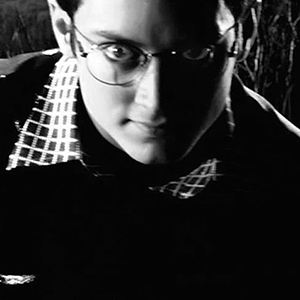
Kevin
Dripping with style, Sin City is a unique visual feast that thrills, although the insatiable nature of the graphic violence may deter some. Robert Rodriguez’s distinctive work bears his hallmark, as it allows Frank Miller’s graphic novel to burst into life on the big screen. Everything is oversize – from the nature of the characters to the ferocity of the violence. Black and white images startle with occasional lashings of red. In the attention-grabbing opening sequence when we first glimpse Sin City, a man and a woman are about to embrace. Her lips are scarlet and the dress she wears is one a nice girl would not. But we are given no time to reflect – very quickly the scene is over and we are immersed in a string of action sequences which flow into a narrative. The harshness of red is often a startling slash in otherwise black and white scenes of violence, although blood is not uniquely portrayed as red.
This is a film of extremes. Even the weather is of the all-sorts variety and men and women are stereotypical. The men are as tough as nails, while the women are cheap objects of desire. But the rub comes from the paradox. Some of the men are thugs with illusions of eloquence and Bruce Willis’ John Hartigan is a man searching for redemption. Likewise, the scantily clad dames in fishnets, black leather and silver chains are both sex-symbols as well as angels on a pedestal. Thick false lashes and black Sobranies are but adornments. The women are also symbolic of the redemption the men seek. This is the interesting juxtaposition and the key to the film’s fascination.
There are three overlapping stories that somehow sit side by side in a circular structure. Standout performances by the ensemble cast include Willis as the John McClane (of Die Hard) of Sin City, Clive Owen as a PI caught in the crossfire and a sensational Mickey Rourke as street-wise tough-guy Marv, who looks somewhat like Mr Incredible, and whose brutish exterior conceals a surprisingly sensitive heart. Then there’s Elijah Wood as you’ve never seen him before, a chilling, cannibalistic low-life, hidden behind illuminated glasses, and a disarmingly evil-looking Benicio Del Toro.
Sin City is a film you won’t forget in a hurry. The violence is strictly comic-book style, presented as torrid film-noir action. The characters are shocking and deliver maximum impact, yet the journey for redemption for Willis’ Hartigan and Jessica Alba’s sweet seductress Nancy, is an unexpectedly touching one. The visuals are extraordinary and Rodriguez has a hand in much of it – from the frenetic score to the super-sharp editing. See it – if you dare!
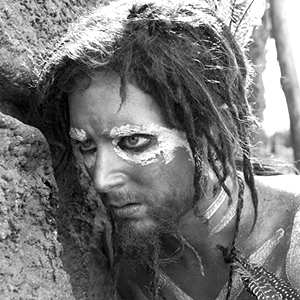
Ben Gunn
If you haven’t seen Treasure Island or do not know the book then I can’t take responsibility for any spoilers. But I did my best!
Finally a raw cut pirate film. Forget about the fanciful dalliances and haberdashery that was brought to you by The Pirates of the Caribbean, and settle down with the real folk. Long John Silver himself. We are all familiar with the story of Treasure Island. But this fresh take on it make it feel like rather a history documentary that you are watching rather than a film.
Jim Hawkins together with his mother own the Admiral Benbow Inn and are having a hard time after his father died. An old drunken seaman named Billy Bones becomes a long-term lodger at the inn, only paying for about the first week of his stay. Jim quickly realizes that Bones is in hiding and is sea faring visitors. Some months later, Bones is visited by a an old shipmate of Captain flint, a sailor named Black Dog. Black Dog requests the treasure map of Captain Flint. Billy Bones seems to know more than he alludes and hence attacks Black Dog who then flees the Inn.
Soon thereafter a blind man turns up at the Inn by the name of Pew also searching for Billy Bones. After receiving a pirate summons in the form of a Black Spot, Billy Bones drops dead to the floor.
The pirates come knocking early only to find Bones dead and the chest of Flint opened. Later on Jim discovers after having removed only one object from the chest, that he had taken the Flint’s logbook and the treasure map to where the loot has been buried. Quickly Jim and Esquire Trelawney plan together to go and find the island on the map. Unknowingly they hire John Silver and his crew to man the Hispaniola.
Things take a turn for the worst very quickly. When they finally get onto the fabled island, the matter of staying alive quickly becomes the moral of the day. Jim runs afoul of Ben Gunn a man who survived the attack of Captain Flint only to find himself on the island on his own.
From then on its “Every man for himself and God for all.”
Eddie Izzard once again performs with such brilliancy that we can see simply by looking into his eyes the plans that John Silver is working on. He says more when silent than when he speaks, his mere presence in scenes is a point of attention. He is a pivotal point where ever he is at. It is a true delight to see him as a pirate. I am charmed and transfixed by his performance. He took the character and made it his own and John Silver fits him like a second skin. Toby Regbo is a stunning young performer, I quite enjoy his work. He already has an impressive amount of work under his belt including a part in Harry Potter and the Deathly Hallows. He is most definitely a skilled actor one has to keep in their sights for his future work which I am sure will be quite worth it. His portrayal of Jim was astounding, the strength and bravery was exemplary.
It is always a true delight to see a film with Elijah Wood, and this is no exception. He has come a long way and his acting is still right on the edge and he is going from strength to strength. He was Ben Gunn, you felt his anxiety alongside of yours. Donald Sutherland’s brief appearance as the notorious Captain Flint was a very well chosen one. His innate sense of self importance was overwhelming and a pleasure to see. Rupert Penry Jones has perfected being unlikable. It is a real enjoyment to watch him as Esquire Trelawney and feel your dislike for him rise by the minute. It takes some serious skill to be able to call such wrath upon yourself.
There is an absolute certainty about this film and it’s found in the wonderful ensemble cast. It’s a powerful dynamic to see one’s energy bounce of another’s and it raises the level of the film to new heights. I have to say it was a true joy to see this film, it was dragging you along into the adventure and it is a film I am sure to see many times over.
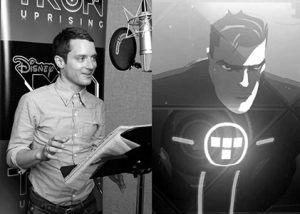
Beck
The Tron universe has existed for three decades, and Disney XD’s Tron Uprising is a new and welcome addition to its science fiction lore. Tron Uprising is an animated story about a young program working as a mechanic in Argon City, a metropolis located in a remote corner of the Grid. The Grid, a digital world of personified computer programs, is quickly being taken over by a corrupt program named Clu. Tron Uprising addresses wonderfully thought provoking themes such as self-determination versus fate, what freedom truly means, and different perspectives of perfection. The art style is frenetic, the colors are bright and the action sequences evoke a palpable sense of danger. The voice acting is stellar; Elijah Wood and Bruce Boxleitner bring a truly emotional and honest performance that pushes Uprising beyond the normal Saturday morning cartoons.
Argon city has escaped much of Clu’s tyranny, but General Tesla has arrived and he intends to subjugate the entire city. Through brutality and coercion, General Tesla is taking over Argon without any kind of resistance. Beck, voiced by Wood, decides to fight back. He joins with Tron, voiced by Boxleitner, and learns guerrilla warfare from one of the best. Slowly forming a resistance, Beck dons the guise of Tron to fight back. He is quickly labeled a Renegade by the military, and turned into an enemy of the state. With the populous undecided as to whether or not the Renegade is actually helping at all, Beck learns no one is safe. Each episode follows the season’s story arc of a gradual build to full revolution. The individual stories in each episode are deeper than the often seen 30 min wrap up, where all is well by the end. A play for the long game is being made, while each episode does have a focused topic, such as the repercussions of vengeance, or a friendship being tested, the story of revolution against tyranny is never forgotten.
The concepts and themes explored in Tron Uprising are some of the most interesting on television today. The Grid has existed without change for a long time, but Uprising begins with a world in flux. There are new programs called Iso’s, these programs are spontaneously formed from the Grid, they have no set programing or creator. They challenge the core concept of programs in the Grid that a program is designed and created for one task; breaking from that role is looked down upon. Concepts like the definition of perfection and beauty are deconstructed as the dictator program Clu uses his army lead by General Tesla to conscript and control all programs, making them perfect. In Clu’s mind, a unified submissive populous is the only way to achieve perfection and beauty. The writing avoids cliches, and focuses on relationships between the main character and the programs he calls friends.
Uprising’s art style is reminiscent of Aeon Flux, with elongated limbs, and stark shadows. The addition of cell shading and a touch of computer animation drive home the concept that this is a digital world. Argon’s streets resemble circuitry, and the buildings are more like computer chips than skyscrapers. The action is frenetic and thoughtfully choreographed. The fight sequences in Uprising bring to mind the intensity shown in Spectacular Spider-Man. The danger is real, as we see friends of the main character die in the first episode.
The main character Beck, voiced by Elijah Wood, works as a mechanic, while Tron voiced by Bruce Boxleitner, lives in exile. It was great to hear Mr. Boxleitner’s voice coming from Tron; it strengthened the connection between both of movies. Wood allows his character Beck to be a young program full of insecurity and brash decisions, but also interlaces a moral integrity and maturity that pushes Beck to make the sacrifices needed to lead a revolution. The character Paige (voiced by Emmanuelle Chriqui), is one of the more interesting characters, as we see her morally conflicted between serving as Tesla’s field commanders, her admiration of the Renegade and her desire to do what’s right. All of the voice actors are supported by an intelligent script. The story stays fun and interesting without falling into the repetitive nature of most serial TV shows.
In conclusion, I highly recommend watching Tron Uprising, but beware; it is easy to spend an entire weekend watching this show. With its fast paced action, deep examination into interesting themes and concepts, and the wonderful voice acting of an intelligent script, Tron Uprising has quickly become one of my favorite animated series.
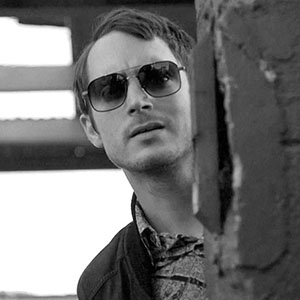
Sgt. David Waters
Sargent David Waters and Lieutenant Jim Stone are not corrupt on the job but they are both sick of their work. Jim is forced to run personal errands for his captain while his idea for new equipment to better his team is brushed off. David sneaks in late to a crime scene, plays with the evidence then laughs it off when a crook escapes from the scene. They both hate their mundane jobs of filing paperwork and cataloging evidence. But when the bail out of a drug dealer raises a red flag about where a large amount of cash comes from, the two friends investigate. They go undercover, gather information and follow tails. When they see an opportunity to get in on the money, they devise a plan to rob a vault they find hidden behind a grocery store that serves as a front.
This is the basic premise of “The Trust.” It’s a two man gig that’s not flashy or elaborate with glitzy high speed car chases or massive shoot-outs despite being set in Las Vegas. Think of it as a much scaled down version of The Italian Job. David and Jim are planning their heist by the seat of their pants and it seems doable to them for their first time out. They don’t assemble techy gadgets to bust the vault except for a high powered drill press. But when executing their heist, things go wrong and they work their way through the mishaps and situations the best they know how – sometimes with success, sometimes not. They don’t exactly pretend to know what they’re doing and this is what I liked most about the movie. Well, besides the harmony between Elijah Wood and Nicolas Cage.
Jim played by Cage is pure Nic, mostly. There’s inklings of the madman he’s known to portray. He’s completely off kilter but he’s not the full blown wacko. Jim is a huge risk taker without thinking of the consequences they can bring. He’s a shoot first and never ask questions type of guy. Nic is all out, giving it his all and in your face so you know his character’s mindset right off the bat.
David on the other hand is the opposite and portrayed well by Wood. We’ve seen him get riled up with other characters he’s played and he does it with conviction here and he brings some ethics to David. It’s not until he’s intentionally doing wrong on the force that he realizes just how corrupt the police can be. Elijah’s performance is much more subtle than Nic’s. It may not be apparent at first but you do get the crux that David knows they’ve gone too far and Elijah is great at conveying his character’s internal conflict.
Jim and David’s opposite poles is very intriguing. When Jim ditches a pre-robbery responsibility the two worked out, David blows up at him by arguing that the implications of Jim’s slacking is dangerous. Soon Jim jokingly reveals he did what he was supposed to do and David is left rattled and pissed off that Jim is taking the heist too lightly. But throughout the movie the two joke, conspire and quarrel and it’s a revelation to witness that type of unexpected chemistry between Cage and Wood. It works beautifully.
The music chosen for the film has a cool 1970s vibe especially the opening and closing song. At times the lack of background music in certain scenes effectively created more tension. This is also true in the long stills that were filmed. When the camera stayed fixed on someone and it was quiet, some deep thinking going on with the characters. This made for good suspense during the heist which takes up most of the second part of the film. A very tense point gave a knee-jerk reaction which was the result of being shocked from other movies that spring surprises on the viewer. As they get deeper into breaking into the safe, circumstances causes David to feel it’s not worth it. At the end of it all the old saying is appropriate. Crime doesn’t pay.
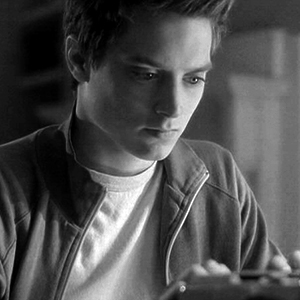
Jones Dillon
Genial and quirky, “Try Seventeen” is a character-driven comedy about a young man (Elijah Wood) striking out on his own, who meets an extended family of rooming-house oddballs, and must ultimately choose between two women among them, one mysterious, the other sweet. Pic’s modest ambitions and execution will result in modest yields, with decent ancillary.
Arriving for his first day of college at a Kansas university and dragging a huge steamer trunk, wide-eyed 17-year-old Jones Dillon (Wood), spends about five minutes with his Ska-loving skinhead roommate before deciding private lodgings might be more suited to his sensitive temperament. (Dillon has an active fantasy life, imagining revenge on cruel strangers and a series of servile and exotic women.) He moves into the sprawling boarding house and is soon dividing his attentions between sweet aspiring actress Lisa (Mandy Moore) and mysterious photographer Jane (Franka Potente). The house’s other tenant is Brad (Aaron Pearl), a hotpants-wearing artist who’s fond of six-shooters.
What’s most on Dillon’s mind is losing his virginity. Title of pic comes from his response to Brad, who confides that he hasn’t had sex in three years. As all this transpires, Dillon carries on a series of contentious phone calls with his hard-drinking Texan mother Blanche (Elizabeth Perkins, who previously played 8-year-old Wood’s mom in “Avalon”). She refuses to reveal to her son the identity of his father, to whom Dillon writes long letters that end up in the steamer trunk.
Debuting helmer Jeffrey Porter has pointed to “The Graduate” as an inspiration for his treatment of Charles Kephart’s script, but there’s little, if any, social conscience on display, nor does the story build to a clear statement on contempo mores. In the end, the quirky vignettes don’t add up to anything except a collection of quirky vignettes, rendering pic a pleasant date movie sans resonance.
Wood’s natural physical qualities serve his character well, and there’s genuine chemistry between him and Potente. Young chanteuse Moore holds her own with the vets, and Pearl is a hoot as the uber-eccentric Brad. Had the script given her more to do after the first couple of reels, Harry might have turned Ma into a gothic vamp.
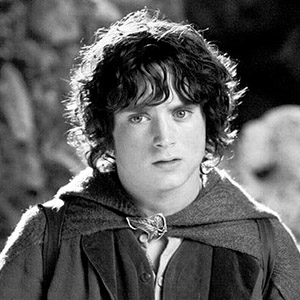
Frodo Baggins
The opening scene of The Two Towers provides an outstanding, yet very brief, taste of action, cinematography, and special effects, only to be matched (and far surpassed) in the final hour of the film. The stunning events of the third hour of The Two Towers are undoubtedly the centerpiece of the film, and while the first two hours serve finely as story development, they primarily build anticipation for the final hour, which mostly depicts the battle of Helm’s Deep. More than anything else, the first two hours merely tease and torment the patient audience. It’s a shame that such a gap has to exist between the first minute and the final hour, but I take no reservations in saying that despite how you feel about the first two hours of the film, the final hour will make the wait entirely worth its while.
As stated, the road to the battle of Helm’s Deep can be enormously long and painful for any viewer aware of what breathtaking scenes await towards the end of the film. Perhaps The Two Towers’ biggest fault is in its own accomplishments; the first two thirds of the film are well shot, well paced, and they necessarily and adequately progress the storyline, but when compared to the spectacular final hour, the first two hours seem uneventful and insignificant. However, to be fair, I feel that it’s simply impossible to create two hours of film that could appropriately lead into the battle of Helm’s Deep. It’s difficult to comprehend how such scenes came to exist in the rather short amount of time Peter Jackson has had to create six hours (so far) of finished film. The battle of Helm’s Deep is simply unreal; it’s unlike any event that has come to pass since fantasy films gained, and regained, popularity.
As assumed, The Two Towers begins where The Fellowship of the Ring ended. The majority of the film follows four separate groups and their story lines: Frodo and Sam; Aragorn and Legolas, Merry and Pippin, and Saruman and his army. The performances live well up to the standards of the first film, with a particularly notable performance from Viggo Mortensen as Aragorn, whose role is significantly larger in The Two Towers. Aragorn satisfies a thirst for someone to root for, a thirst that was left partly unquenched in Fellowship. It’s much easier to root for Aragorn than it is for Frodo; Aragorn has many more qualities of a leading man, a soldier, and a hero. More than once did the audience, filled mostly with academy voters, applaud the heroics of Aragorn. Gollum also shines in a much-welcomed large role, due to extremely realistic computer animation, and a fine performance from Andy Serkis, upon which the animation was modeled. In Fellowship, it was appropriate to consider Gollum one of the many great ‘features’ of the film. However, here he is more of a leading character and a ‘star,’ and his convincing dual-personality, stabbing voice, and well-choreographed body movements make him consistently eye-grabbing and the center of focus of nearly every scene in which he appears.
As was The Fellowship of the Ring, The Two Towers is a visual delight. Those who have seen Fellowship are no doubt familiar with the beauty of the landscapes of New Zealand. The cinematography is, again, one of the best aspects of the film. The swooshing camera movements that follow the armies and horsemen throughout the fields are extremely satisfying in this post-Matrix era. The shots of the ascending enemy-laden ladders in the battle of Helm’s Deep are terrifying and chillingly gorgeous all at once. The visual effects take an appropriate leap forward from those of the first film. While the visual effects in Fellowship were outstanding, the battle of Helm’s Deep provides for the best application of CGI since the rippling waves of The Matrix’s ‘Bullet Time.’ The battle of Helm’s Deep features absolutely awe-inspiring and seamless integration of acting, stunts, and computer animation. Each orc seems to have its own personality, demonstrated in its movements and visual features. The masses of armies fight with strategy and true character, which I imagine is much harder to accomplish than animating thousands of identical clone troopers. The only problem I have with the visual department is the look of Gimli, the Treebeard. Gimli’s visual features seem a bit childish and uninspired, inconsistent with the standards set by the rest of the film. But again, there is simply nothing that compares to the battle of Helm’s Deep. George Lucas and the Wachowski brothers certainly have not created anything that approaches the grandness and magnificence of The Two Towers’ final hour, and I doubt they will do so anytime soon.
In The Fellowship of the Ring, I had a few minor problems with Howard Shore’s score. While I thought it was gorgeous and it established several very memorable themes, I don’t think it handled the sentimental scenes (opening in the Shire, Gandalf’s passing) properly. I thought it caved in to the melodrama a bit too much, resembling the emotions from James Horner’s Titanic. However, I believe that The Two Towers requires the type of score which Howard Shore accomplishes best: dark, continuous, and unrelenting, as demonstrated in Se7en and Silence of the Lambs. The theme used in many of the action scenes in Fellowship (low brass, six notes repeated with a rest in between) is much more present in The Two Towers, appropriately. A brand new theme is also unveiled, the theme for Rohan, a prominent kingdom in Middle Earth. Rohan’s theme is played more often than any other melody in the film, underscoring most of the memorable and heroic scenes with great effect. Howard Shore undeniably exhibits his skills as an ‘A-list’ composer, and with a possible double Oscar nomination this year for The Two Towers and Gangs of New York, he could get propelled to the very top of the ‘A-list,’ right beside John Williams and Hans Zimmer in terms of demand.
If not the picture itself, there should be a way to recognize and award the battle of Helm’s Deep. The battle sequence alone represents successful filmmaking in its highest form. The choreography of the battle, the visual effects, the pacing, acting, cinematography, and music, all work together in perfection to achieve grand filmmaking which is as entertaining and enjoyable as film can be. For this very reason, no one, whether a fan of Fellowship or not, should miss The Two Towers.
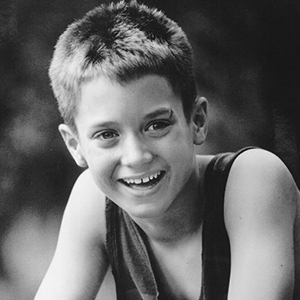
Stu Simmons
If they gave out Academy Awards for earnestness, The War would have to be one of the front-runners. War, it solemnly intones, is bad; so are racism and sexism. And so they are. But The War unfolds as though it had discovered those concepts, never letting an opportunity for an applause-generating speech go by the wayside. As a result, some very impressive performances are wasted on a script that just tries far too hard to deliver a very simplistic moral.
The War is the story of the Simmons family, living in Juliette, Mississippi circa 1970. Father Stephen (Kevin Costner) is recently returned from Vietnam, suffering from post-traumatic stress disorder and unable to hold down a job, leaving it to mom Lois (Mare Winningham) to keep the family afloat.
Their two children, meanwhile, face battles of their own. Stu (Elijah Wood) and his friends find themselves in perpetual conflict with a surly group of siblings called the Lipnickis; Lidia (Lexi Randall) finds out about racism through the mistreatment of her black best friends in school. But the siblings share a love of their treehouse fort, and learn their own lessons about war when the Lipnickis try to take it from them.
When Costner and Wood are the focus of attention, The War is actually quite compelling. Costner gives an intelligent, understated performance which shows Stephen’s desperate attempts to find purpose in the post-Vietnam world where he needs to feel he’s making a difference, and to impress upon his children the futility of fighting, while Wood gives Stu an undercurrent of anger towards Stephen even as he tries to support him. There is tremendous conflict in their relationship, and both actors do a fine job of bringing it out.
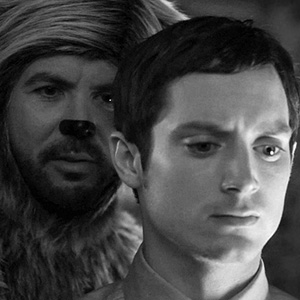
Ryan Newman
I loved Wilfred from the first couple of minutes until the last two-part, amazingly touching and well-crafted finale. It’s a series that was so incredibly easy to make a sizzle reel for — a foul-mouthed, pot-smoking, beer-drinking, oversexed dog, portrayed by a scraggly-faced Australian, is never not funny. Alongside Gann was Elijah Wood as Ryan, the neighbor we meet in the first episode trying to kill himself. Wood was criminally under-acclaimed for his work on this series and the more you watch it and revisit the episodes — they stay remarkably fresh on repeated viewings — the more you’ll see that.
Fiona Gubelmann played Jenna, Ryan’s bubbly and adorable next-door neighbor, whom he falls hopelessly in love with; she is, arguably, his reason for not going through with his suicide attempt again. Zuckerman’s evil genius plan was, in many ways, Gubelmann, who is so immensely likable. She asks Ryan nicely if he’ll watch her dog, Wilfred, while she goes off and, you know, doesn’t really take care of him during the day — and the series is off and running.
In the early years, it was hard to believe that Jenna was selfish and weak and would prey on Ryan’s insecurities because his love was, for the most part, always going to be unrequited. Why fall for Ryan who, sure, was depressed but also reliable and sweet and smart and thoughtful when she could have Drew (Chris Klein), the good looking, well-hung lunk from her old hometown of Sheboygan (the series is set in Los Angeles, which was also helpful because that sunny, ultra-positive vibe where everybody seems successful went against Ryan, whose sense of alienation from happiness never seemed to fit society and, of course, Wilfred, who literally and figuratively shits on everything). Setting up Jenna as the manic pixie dream girl and as the embodiment of what Ryan thinks will make him happy was perfect in its way, as Zuckerman knew, because so often the things and people we love and think will make us happy end up letting us down or leaving us unfulfilled.
Wilfred managed to be a lot of things at once. It was ridiculously crude and funny — Wilfred was in a sexual relationship with a stuffed bear called “Bear” and constantly made vile jokes and flew into fits of hilarious rage at other dogs or people. At the same time, Wilfred was an existential philosopher and life coach for Ryan and Gann could always deliver the goods on both — even when Wilfred went particularly heavy on the existential elements and ratcheted up the uncertainty as to whether Ryan was really seeing a man in a dog suit or whether Wilfred was a real dog and poor Ryan was schizophrenic. As sweet as Ryan is, his sister Kristen (Dorian Brown) is wonderfully awful. Over the course of four seasons, Brown’s contributions were perfectly delivered.
I loved that despite its coarseness there was always something tender about the series; it could be hilariously, fearlessly inappropriate one moment and then deftly re-establish that Ryan was essentially alone and vulnerable in the world and Wilfred was his best friend, trying to make him happy. You can’t disapprove of a boy and his dog, right?
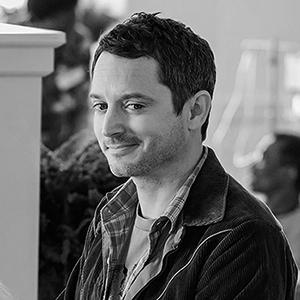
Walter Tattersall
Christina Ricci’s Misty is teaming up with Elijah Wood’s Walter in Yellowjackets season 2 and fans cannot be more excited. Yellowjackets season 2 premiered on Sunday, March 26, 2023 on Showtime to critical and fan acclaim. After the first season made a splash last year, fans eagerly awaited the answers to the mysteries that Yellowjackets’ teased in the season 1 finale.
Yellowjackets’ season 2 jumps between the past and the present, much like the first season. Set two months after the events of season 1, Yellowjackets shows Misty investigating the disappearance of Natalie (Juliette Lewis) with the help of a mysterious citizen detective who responds to Misty on a message board. In Yellowjackets episode 2, the audience learns that the mysterious man is Walter (Elijah Wood).
In Yellowjackets season 2, it is revealed that Walter knows where Misty works when he shows up with an elderly woman under the guise of care. He leaves her a note inviting her to help investigate Adam’s disappearance. The star power of both Christina Ricci and Elijah Wood in Yellowjackets makes the duo a formidable pair. Not only do both actors lose themselves in their roles, but both actors seem to already share a chemistry despite not speaking to each other in person in the first two episodes.
Yellowjackets season 1 shows Misty to be an eccentric woman who was clearly traumatized by her experience in the woods, as well as some other childhood trauma that Yellowjackets season 2 could potentially explore. Giving Misty a buddy detective gives Yellowjackets the opportunity to further explore her character, as well as provide a moral dilemma for Misty later when Walter gets too close to the truth.
Based on the message board exchanges, it seems that Walter is like a male version of Misty, which likely means he will become a frenemy/rival for Misty. Misty is one of Yellowjackets’ most unique characters, which is only heightened by Christina Ricci’s performance. Giving Misty a male counterpart could give her a mirror into her own behavior and make for compelling drama. Seeing that Walter shows up at Misty’s work randomly it illustrates that he is one step ahead of her, which means he can be a foil to Misty.
Elijah Wood’s charm will only add to Walter’s character as Yellowjackets continues to follow his investigation. Based on some of the previews, it appears that Misty and Walter will be a deadly duo who may share many common traits. Yellowjackets season 2 will continue Misty’s attempt to cover up Shauna’s crime, but we will have to wait to see if Walter will be too clever for the group.